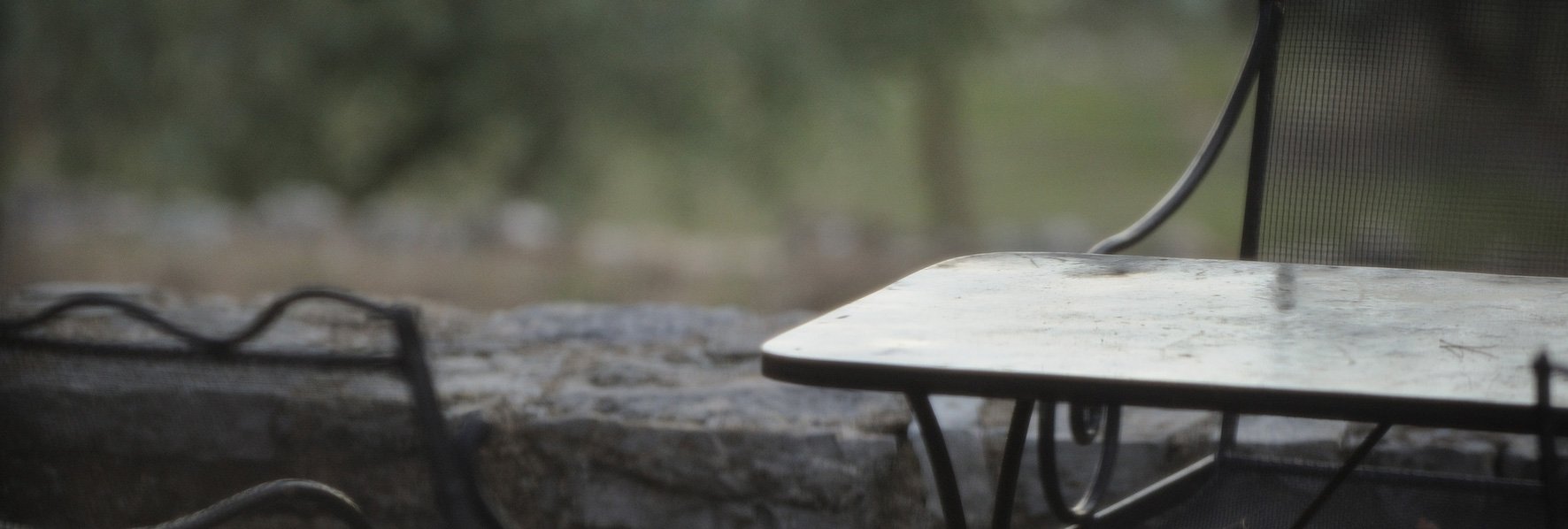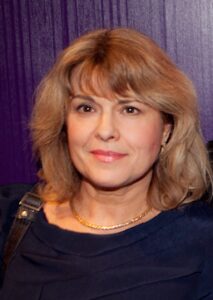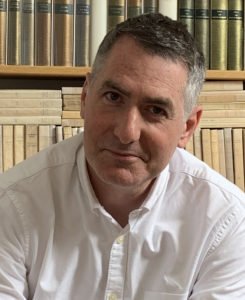Each year, the Fondation des Treilles offers to a writer of fictions or essays a privileged place and an allowance to carry out a writing work meant to be published.
Residences are open to experienced authors, writing or publishing in French or working in the field of Francophone culture.
The applications are examined by a jury of 7 people, composed of academics and critics and appointed by the board of directors of the Fondation des Treilles.
The laureates are welcomed between March and November (with an interruption in August), in one of the estate houses. All the necessary equipment to devote themselves entirely to their work is at their disposal, mainly a library and computer connections to the web. Meals and cleaning are provided by the foundation.
The residency comes with a monthly fee of € 2,650, paid accordingly to the length of stay of the residents.
Writers wishing to compete for the Foundation’s Author’s Residency Prize are invited to read the rules and regulations.
To know when to send your application, please consult the following page: calls for applications
For any question, please write to: prix.ecriture@fondationdestreilles.com
To apply, please see our section candidatures au prix Résidence d’Auteur in our French menu (form available during the application period).
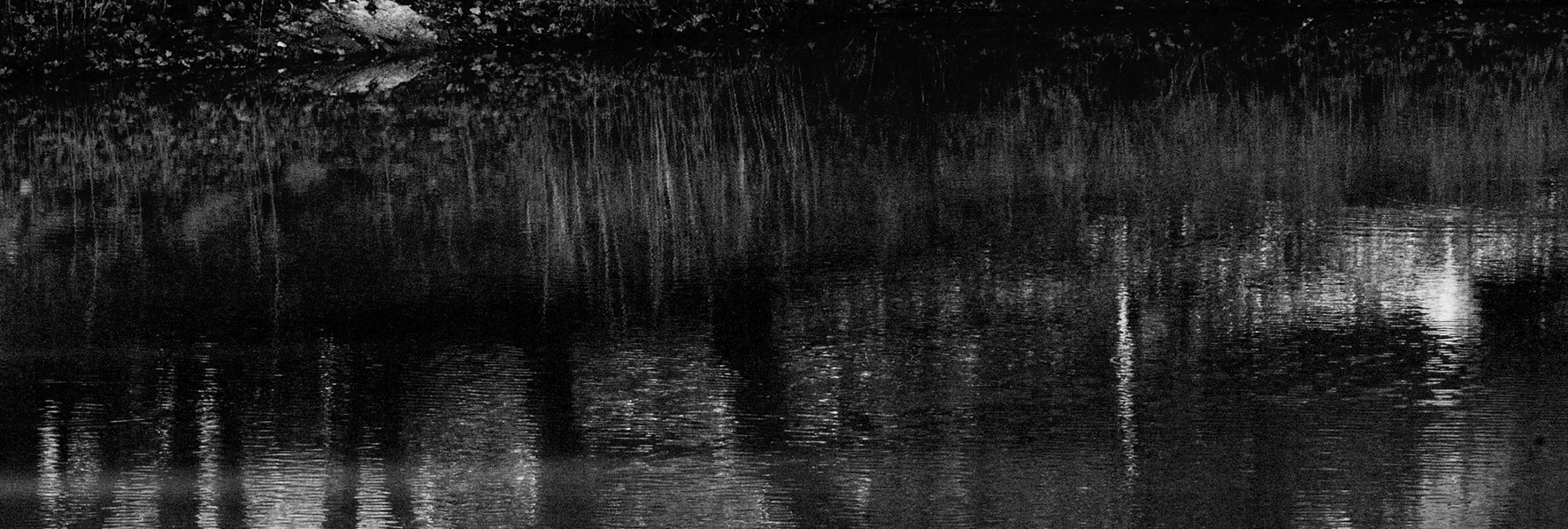
Reflet dans le lac du bas © Dominique Laugé
The laureates over the years
Olivier CIECHELSKI
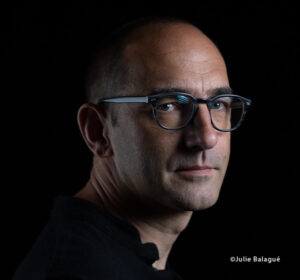
After studying literature, Olivier Ciechelski directed several short films and documentaries, most of which were selected in festivals in France and abroad. He then turned to screenwriting, first as a reader (for Canal+ in particular), then as a screenwriter, script doctor and a playwriting professor in a film school.
After the publication of an essay on Ursula K. Le Guin by Actu SF, then a first novel by Rouergue in 2023, he decided to devote himself as much as possible to literature.
His project
The Book of Wonders, his next novel, tells the story of Nora, a very religious young woman who joined the police in the hope of bringing justice and peace to the streets of her city. But a tragedy shakes her faith in God and her confidence in the justice of men, revealing an unsuspected dark side and power in her. The Book of Prodigies borrows ideas from the noir fiction, the vigilante movie, fantasy and the Golden Legend, in the hope of bringing together the ultra-contemporary and the immemorial time of myths and legends.
Gaëlle OBIEGLY
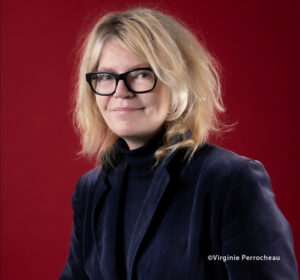 Gaëlle Obiégly is a writer. She was born in 1971. She has memories of solitude and boredom from her rural childhood. But it was there that her passion for literature germinated. Her first book, a novel, was published in January 2000 by Gallimard. Since then, she has published eleven fictions with this publisher, with Verticales and with Christian Bourgois. She was a resident of the Villa Médicis in 2014-2015. Sans valeur (worthless) is to date her last published book.
Gaëlle Obiégly is a writer. She was born in 1971. She has memories of solitude and boredom from her rural childhood. But it was there that her passion for literature germinated. Her first book, a novel, was published in January 2000 by Gallimard. Since then, she has published eleven fictions with this publisher, with Verticales and with Christian Bourgois. She was a resident of the Villa Médicis in 2014-2015. Sans valeur (worthless) is to date her last published book.
Her projet
“Initially, the purpose of the book is a retrospective of the work of an artist who exists in real life. I work from what exists. But it is a novel.“
In this fiction, spectators are confronted with a layout of empty rooms. If there is nothing visible, the work is nevertheless revealed through language. To put it another way, the works are exhibited by a storyteller who describes them and narrates their interactions. We visit an exhibition in which the works are not visible. However, they are not absent. It’s about replacing the image with its narrative. Entirely told by a narrator, the works that form the subject of the exhibition become chapters of a story that goes beyond them.
Jean-Noël ORENGO
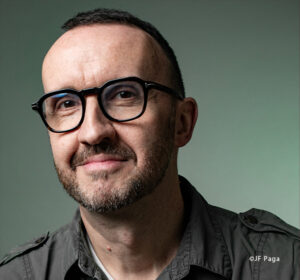 Born in 1975 in Paris, Jean-Noël Orengo grew up in Seine-Saint-Denis. After his military service and unsuccessful studies in philosophy and architecture, he went from one small job to another, particularly in the art world. A more stable job at the Bibliothèque nationale de France allows him to make numerous stays in South-East Asia, the region of the world he prefers, with Italy and the country of Nice. He began to publish his first texts in poetry magazines at the end of the 1990s. He abandoned all paid employment in 2012, the only solution found to finish his first novel at all costs. Published in 2015 by Grasset, La Fleur du Capital won the Flore prize and the discovery grant from the Prince Pierre of Monaco foundation. Thanks to the unwavering support of Olivier Nora, director of Grasset editions, he published L’Opium du ciel (Sky opium) in 2017, Les Jungles rouge in 2019, Femmes sur blanc (Women on white) in 2023. He is also the author for Les Cahiers Dessinés editions. from Vivre en peinture (Living in Painting), a monograph by the painter Jean Raine. In August 2024, Vous êtes l’amour malheureux du Führer (You are the unhappy love of the Führer) will be published by Grasset.
Born in 1975 in Paris, Jean-Noël Orengo grew up in Seine-Saint-Denis. After his military service and unsuccessful studies in philosophy and architecture, he went from one small job to another, particularly in the art world. A more stable job at the Bibliothèque nationale de France allows him to make numerous stays in South-East Asia, the region of the world he prefers, with Italy and the country of Nice. He began to publish his first texts in poetry magazines at the end of the 1990s. He abandoned all paid employment in 2012, the only solution found to finish his first novel at all costs. Published in 2015 by Grasset, La Fleur du Capital won the Flore prize and the discovery grant from the Prince Pierre of Monaco foundation. Thanks to the unwavering support of Olivier Nora, director of Grasset editions, he published L’Opium du ciel (Sky opium) in 2017, Les Jungles rouge in 2019, Femmes sur blanc (Women on white) in 2023. He is also the author for Les Cahiers Dessinés editions. from Vivre en peinture (Living in Painting), a monograph by the painter Jean Raine. In August 2024, Vous êtes l’amour malheureux du Führer (You are the unhappy love of the Führer) will be published by Grasset.
His project
Paris et le Néant : the narrator calls himself Noël Stavisky. Still alive, he claims to have been born in 1914 in Paris, to two Italian mothers of Jewish faith. In 1937, he became the private secretary of Alberto Giacometti and Samuel Beckett, who had just met. His full-time commitment would have been so confidential that no biographer has kept track of it…
Very quickly, they become fathers to him. They consider him more as a model than a secretary, and push him to extreme experiences necessary for their inspiration: weight loss, homelessness, multiple logorrhea… Wanting and knowing himself to be a poet, Stavisky benefits as much as he is subject to their influence, from which he often breaks away with violence…
He will nevertheless find himself at the center of a collaboration with them to create an impossible work of uniting writing, sculpture, painting and staging… Throughout his narration, he will claim to be leading a crusade against Nothingness , whose impulses he will sometimes involuntarily embody. Apart from Stavisky and a female character with whom he is in love, all the places, individuals, artistic or political movements in this book are true and abundantly documented. We will also discover an ironic portrait of Paris, la plus belle ville du monde (the most beautiful city in the world), la capitale des arts et des lettres (the capital of arts and letters), le refuge des exilés de la Terre (the refuge of exiles from Earth), from the 1930s to the present day.
Cédric Dentant, Christophe Etemadzadeh, Cécile A. Holdban, Maïa Hruska
In 2024, the Fondation des Treilles will welcome Cédric Dentant for 2 months for the writing of a poetic-scientific essay on the last plant, as well as Christophe Etemadzadeh for 3 months for his autobiographical novel project, the Furtive Years. Cécile A. Holdban will then come in residence for 2 months to write a portrait novel on Marc Chagall, focusing particularly on his bestiary. And finally, Maria Hruska will stay for 1 month to write about language and the self.
Cédric Dentant
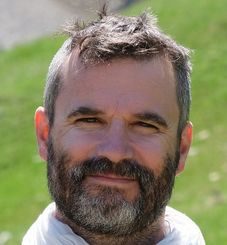
Cédric Dentant is a botanist, mountaineer and author. A specialist in high altitude flora and member of the scientific service of the Écrins National Park, he works in the Alps, the Andes and on Himalayan plants. The collaborative research in which he participated allowed the description of several new species of plants at the altitudinal limits of life. Finally, for several years he has been carrying out research in historical ecology (analysis of the evolution of ecosystems based on historical data), in order to understand how life evolves in extreme environments.
Writing is important to him : author of Flora verticalis (2017), of Et si Darwin avait été alpiniste? / And if Darwin had been a mountaineer? (2020) and finally La botanique des cimes/ Mountain botany (November 2023), he has recently switched to the comic book scenario adventure.
His project
Book title : The last plant
Literary genre : poetic-scientific essay
Our relationship with plants seems to come down to the use we can make of them: a plant is only of interest to us if it “serves something”. Would our inability to recognize otherness in plants be an asset of our species in order to live and exist?
A popular term that has recently emerged for the plant world offers a new perspective: “intelligence”. Could plants have it?
The ambiguity of the term is not unrelated to its success, because intelligence as we understand it implies an intention – we will come back to that. But the debate is not as lively as it seems: for many, the evidence, common sense, is enough to deny any form of intelligence to plants, beings that are immobile on our scale of perception and devoid of a sophisticated neuromotor system. Other authors propose more prosaically to recognize in plants a unique “sensitivity” to the world. This concept has the merit of including both an emotional and physical component. Would it be preposterous to recognize bodily sensitivity in plants? If it seems that the “plant cause” still has to wait, at least new attention is emerging.
This writing project will attempt to tell stories about plants, without speaking for them. Or at least try: their way of being in the world, so foreign to ours, could literally be described as “alien”. The subterfuge is then perfect for talking about them: venturing towards the extraordinary, to the terrestrial limits of life: at high altitude, in the most “extraterrestrial” of our geographical margins. Where humans have never settled, but where many plants live.
Christophe Etemadzadeh
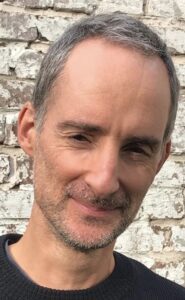
He was born in 1975, in Lille, to an Iranian father and a French mother.
After his studies, he taught French for five years. Since then, with a few gaps, he has devoted himself to writing.
In 2013 he published a book of aphorisms, L’orgueil qu’on enferme/The locked pride (Liber), but most of what he writes falls into the autobiographical genre (in the old sense of the term: it is not about autofiction).
His first story, Zardosht (et autres pièces du puzzle/and other pieces of the puzzle), was published by Gallimard in 2006; the last, La vie sans savoir/Life without knowing, at Arléa in 2021.
His project
Book title : Les années furtives/The stealth years (provisional title)
Literary genre : Autobiographical novel
“I intend to continue during my residence in Les Treilles the autobiographical enterprise of which “Life without knowing” was the beginning. Memory and filiation are the main themes of the work, which tells the story of a family as much as that of an individual.
The first volume was devoted to the childhood years; the second, which is currently entitled “The Furtive Years”, will evoke adolescence and entry into adulthood.
Close in spirit to a coming-of-age novel, the story will include some surprises and dramatic twists that the first volume prepared; until the last chapter which will constitute, around a conflict between father and son, a sort of crux for the entire work.”
Cécile A. Holdban
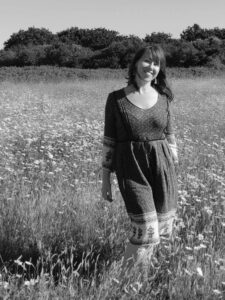
Cécile A. Holdban, of Franco-Hungarian origin and culture, is an author, painter and literary translator from Hungarian and English. She writes a literary column in the show Au fil des pages/through the pages on Aligre fm.
The connections and circulation between the arts are at the heart of her work. Her creative universe is based on these synesthetic relationships. It is particularly enriched by the observation and imagination of nature and the environment.
She is the author of twelve books of poetry, as well as around fifty artists’ books. For her work Poèmes d’après (afterwards poems) followed by La route de sel/ the salt route, published by Arfuyen in 2016, she won the Yvan Goll prize and the Calliope prize from the European Cenacle.
In 2023 she completed her first book in prose, dedicated to the evocation of the destiny of fifteen women poets of the 20th century, Premières à éclairer la nuit/ First women to light the night (published by Arléa, January 2024), for which she had obtained a creation grant from the CNL in 2019.
She collaborates with magazines (Europe, La revue de belles lettres, Jardins, Alkémie, En attendant Nadeau, etc.), through files, poems, articles, reading notes and translations. She co-directs the online journal of contemporary literature and art « Ce qui reste » (what’s left), which combines the world of a writer with that of an artist.
Her project
Book title : Chagall cheval/ Chagall horse
Literary genre : Narrative novel
In a story based on biographical elements, but also on her own notes during visits to various places where his works are exhibited, the Chagall museum in Nice, the Maeght foundation, the Garnier opera, the cathedrals of Reims, Metz and Mainz (for its stained glass windows), from his tomb in Saint-Paul-de-Vence, and from reading his own books and those he illustrated, she offers a personal portrait of Marc Chagall.
A portrait which does not obey the linearity of the biographical narrative, but seeks to embrace the variegated richness, the joyful melancholy of his paintings, focusing particularly on his bestiary: red or yellow donkeys, flying goats, chickens giants, cats with Pierrot faces, hybrid beings, fish with arms, etc. This menagerie is particularly present when Chagall celebrates love and/or music.
Animals even seem inseparable, in his perception of the world, from these two essential parts of life. She also wishes, through this theme rarely addressed in Chagall’s work, although it is absolutely central, to evoke the presence of exile and Jewishness in his pictorial universe. This dreamlike bestiary is a voluntary extension of Chagall’s childhood which allowed him to go through the trials of the 20th century. Granddaughter of Hungarian exiles and painter, Cécile A. Holdban weaves discreet links with her own family history.
Maïa Hruska
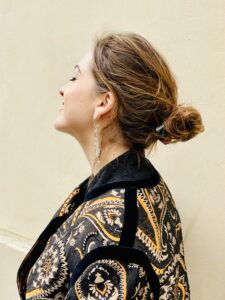
Born in 1991 into a Franco-Czech family, Maïa Hruska grew up in Germany and continued her university studies in the United Kingdom. She now lives in London. Alongside her work as a lawyer in publishing, she is preparing an essay to be published by Editions Grasset, provisionally entitled «Pokoï», which will be the subject of her stay at the Fondation des Treilles. In September 2024, she published Ten Versions of Kafka with Grasset, a work for which she won the Transfuge Prize for Best Essay as well as the Malraux Prize, for the Art Essay category.
Her projet
Book title : Pokoï
Literary genre : Essay
Every language carries a vision of the world: this has been repeated a thousand times since Humboldt and Goethe. This statement is as banal as it is necessary. Her book aims to shed light on the ways in which a language also, and above all, carries a vision of itself. Who says “I” in a polyglot? The answer to this question becomes more complicated depending on whether the polyglot seeks to translate someone else’s story or whether he seeks to translate himself.
Valery said that “there are some me which are more me than others”. Where does this “me” nestle in a polyglot? Is it fragmented, multiplied across languages? Or does it remain sovereign, chemically pure, detached from all contingency, imperturbable beyond languages?
In the twentieth century, this problem was experienced and documented in a way that was as heartbreaking as it was fruitful by writers who adopted several languages during their lives. Adorno, Anders, Triolet, Nabokov, Arendt, Brodsky, Kundera, Levinas, Bellow, Kafka, Brod, Roth (Joseph), Canetti, Freud, Todorov, Gombrowicz: exiles, Europeans, polyglots. Multilingualism covers both the content and the form of their works. Within them are intertwined the language of their childhood, that of God, that of writing, that of their love, that of the country where they resided before, that of exile and, sometimes, that of return.
Sylvie Doizelet, Eugène Ébodé, Carine Fernandez
In 2023, the Fondation des Treilles will welcome Sylvie Doizelet for 2 months to write the book Le rendez-vous. Eugène Ébodé will then come for 4 months to write a novel about the celibacy of priests and the dilemma between love and faith. Carine Fernandez will stay for 2 months to write about the life of Léandro Urbina de Piedraescrita, Castilian adventurer who roamed Europe in the midst of the ideological and political upheavals of the Revolution and the Empire.
Sylvie Doizelet
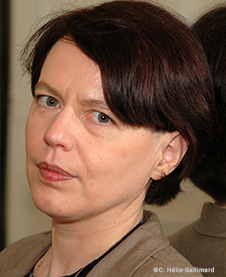
Born in Lyon in 1959, she left to live in London as soon as she obtained her baccalaureate and then, after a few years between London, Lyon and Paris, “settled” in Paris in 1981, following her meeting with Raphaële George and Jean-Louis Giovannoni (Les cahiers du Double/ the Notebooks of the Double). Twenty years later, in 2001, she left Paris for Aude, Arbois, La Panne, Bonfol, Beurnevésin, Aube, and she now lives in Boulogne-sur-Mer. In 1992, she published her first novel Chercher sa demeure (Looking for home) at the Gallimard editions, and since that time, she has alternated the publication of novels with that of portraits (Sylvia Plath, Rodenbach, Thomas de Quincey, Ruusbroeck, Kubin, Moore, Barlach, Kollwitz…), as well as translations (Ruth Rendell, Ted Hughes, Joyce, Laura Kasischke…). She is currently working on a portrait of John Cowper Powys.
Her project
Book title : Le Rendez-Vous (the meeting)
Literary genre : Novel
“There are those who write about who they are and question their history. There are those who are just a sounding board, a receptacle. Even if the word scares me a little, I am a “medium” novelist. I see images and I hear voices.
For decades, the images have not appeared and the voices have been indistinct. Drowned in an unpleasant hubbub. Apart from a welcome flash that allowed me to write the short novel “Loch Ness”, my imagination is dry or, rather, saturated with too much information.
During these years I worked. I spent a lot of time with the German artist Käthe Kollwitz, I immersed myself in the unpublished writings of Jean-Claude Pirotte in order to publish them as well as possible, I explored and translated the poetic universe of Laura Kasischke, now I am immersed in the work of John Cowper Powys to trace his portrait. Exciting activities, related to creation, but…
But I would like to become a novelist again. Empty my mind of its parasites (in part at least). To be receptacle again, “medium”. No question of trying to force the images and the voices to come back, of course, but to give me an appointment at Les Treilles, in this place that I know is beneficial. Most importantly, giving appointment to “my” characters, and knowing that when I arrive, they’ll be there.”
Eugène Ébodé
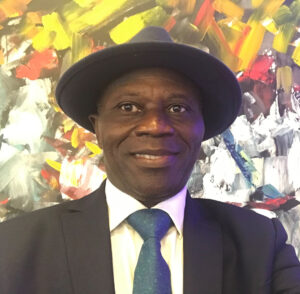
Eugène Ébodé was born in 1962 in Douala, Cameroon. He is currently administrator of the chair of African literature and arts at the Academy of the Kingdom of Morocco and professor at Lansana Conté University in Sonfonia, Guinea. Doctor in French and Comparative Literature (Paul-Valéry Montpellier 3 University), Doctor Honoris Causa from the Mahatma Gandhi University of Conakry (Guinea), graduate of the Institute of Political Studies of Aix-en-Provence, graduate of CELSA (School of Advanced Studies in Information and Communication Sciences), he has also been a literary columnist for the Swiss daily “Le Courrier de Genève” since 2006. He has published contributions in the prestigious journal NRF (Nouvelle Revue Française), including Poetics of a Double Master (NRF, Gallimard, 2021), a tribute to the writer Édouard Glissant. He refutes the argument of Western hegemony in “Against Victor Hugo’s discourse on Africa” (in What is Africa? collective work co-edited with Dr Rabiaa Marhouch and prefaced by Pr. Abdeljalil Lahjomri, coll. Sembura, La Croisée des chemins, Rabat, 2021).
His novels present a diversity of territories, continents and themes, the main titles of which are: La Transmission (Gallimard, 2002, folio 2020), La Divine Colère/ Divine anger (Gallimard, 2004), Silikani (Gallimard 2006), Le Fouettateur (Vents d’ailleurs, 2006), Métisse palissade/ mixed race fence (Gallimard 2012), Souveraine Magnifique/ Magnificent Sovereign (Gallimard 2014), La rose dans le bus jaune/ The Rose in the yellow bus (folio Gallimard, 2016), Le balcon de Dieu/ The Balcony of God (Gallimard, 2019), Brûlant était le regard de Picasso / Burning was the gaze of Picasso (Gallimard, 2021). His latest novel, Habiller le Ciel / Dressing up the sky (Gallimard 2022), is a fresco on African youth and a catafalque of papers devoted to her mother, immortalized like an energetic and dazzling Mama Africa. Eugène Ébodé is a member of the jury for the “Orange Prize for Books” in Africa and president of the jury for the “Williams Sassine Prize”. Knight of Arts and Letters, his literary work has received numerous awards including the “Prix Eve Delacroix of the French Academy”, “the Great Literary Prize of Black Africa”, and the ” Jean d’Heurs Prize of the historical novel” .
His project
Book title : Angelina Salomone
Book’s theme : The celibacy of priests and the dilemma between faith and love
Literary Genre : Novel
In the suburbs of Naples, near Herculaneum, at the beginning of the twentieth century, Angelina Salomone was born. This child, initially reserved in the first part of her childhood, will, from the start of school, turn into a mischievous child. His parents, farmers and vineyard owners, came down to Campania to leave a Lombard family that a history of inheritance had deeply divided.
Angelina Salomone, who has become a young girl, will fall in love with a young priest, Francesco Saponaro, who is returning from Africa where he spent his early years of priesthood. This love, at first secret then stifled by the two young people, will burst one stormy evening.
Then begins a period of great trouble for the two lovers. Francesco does not want to give up his priesthood. He tries, in prayer and retreat, to leave a love he holds dear. Angelina, meanwhile, does not want the discovery of this forbidden love to tarnish the image of her family.
She then believed to find a last solution with the Pope. She decided to open up to him with a letter in the form of a confessional: “Dearest Holy Father, I did not enter into love, it spread inside me and its face has a first name: Francesco. He is a priest. We fought the evidence as much as we could before falling into what is called sin but has a name: love. I am faithful to the Church and the vow pronounced by Francesco belongs to what he cannot renounce. Members of the community of believers in Jesus Christ, Our Saviour, we are aware, dear Holy Father, of the permanent heartbreaks in which our faith as much as our love, inflexible, also lead us to an impasse. I do not come to you as a conspirator and a protester, but a faithful confronted with the harsh law of feelings that unite and only want to flourish with the chosen one of the heart. Here I am, very Holy Father, clashing with principles but begging you to save me from opprobrium like mortal panic. I come to you because I feel ready to blaze like dry grass against the advancing flame of despair. What to do ? »
Carine Fernandez
Born in the Lyon region to a Spanish Republican father, a political refugee, she in turn saw her journey take place under the sign of exile. She spent more than twenty years of expatriation in Egypt, Lebanon, Saudi Arabia and the United States, while pursuing distance studies with the University of Lyon II. As a real autodidact, she does not like school, but books, and discovers a passion for research. After a first doctorate on Voyage en Orient (Travel to the middle-east) by Gérard de Nerval, she defended a state thesis on Vathek by William Beckford.
Back in France, she began to publish academic reviews and literary texts. She collaborated with the magazines « La main de singe » (the monkey hand) et « La polygraphe » (the polygraph) and published a set of poems, Les idiomes de l’Ouest (the western idioms), with Tarabuste editions. Her first novel, La servante abyssine (the Abyssinian maid) (Actes Sud 2003), is a picaresque novel set against the backdrop of Saudi society. In parallel with her teaching career, she now devotes herself to writing and publishes two other novels with Actes Sud editions: La comédie du Caire (the comedy of Cairo) and La saison rouge (the red season). She published a collection of short stories, Le châtiment des goyaves (Guavas punishment), with Dialogues editions, then a short account of the rise of violent far-right groups, Identités barbares (barbarian identities), with J.C. Lattès.
With Mille ans après la guerre (a thousand years after the war), a novel published at Les Escales, she returns to the tragedy that prefaced her existence by awakening the hidden memory of the Spanish Civil War.
Her latest novel, Un jardin au désert (A Garden in the Desert) – Les Escales 2019 – paints a colorful family fresco in Saudi Arabia, a strange country she knows intimately.
However, she considers her collection of poetry, Les routes prémonitoires (Premonitory roads), published by “La Passe du vent” in 2018, as her « manifesto ». Poetry has always been first in her career, it has always accompanied her. It has passed in her gaze, in her ear, it infuses her novels. She is above all a novelist and poet.
Her project
Book title : Le Castillan des Lumières (the Castilian of Enlightenment)
Literary Genre : Novel
Le Castillan des Lumières (The Castilian of Enlightenment) draws a picaresque novel with a lively tone that is set in the context of the end of the 18th century. It sets out to retrace the life of Léandro Urbina de Piedraescrita, a Castilian adventurer who roamed Europe amidst the ideological and political upheavals of the Revolution and the Empire.
Descended from an aristocratic family with a military tradition, Leandro is the grandson of Guzman de Piedraescrita, captain of the Spanish army in Flanders. In 1715 at the time of the surrender, Guzman returned to Spain with Esteban, one of the twins he had with a Flemish concubine, leaving the other to the mother. He will have Esteban (Léandro’s father) brought up by his wife with his other legitimate children and will only reveal his true origins to him post mortem. Esteban, who also became a soldier, brought up in the inflexible code of honor, will remain silent about his origins, rejecting this foreign and above all commoner lineage of which he is ashamed. It was not until Esteban’s death that his son would in turn discover his Flemish origins. The young Léandro, in reaction to generations of soldiers who believe that a man must die standing, has left his military career to become a writer. He is a poet, passionate about theater and philosophy, steeped in this cosmopolitan spirit of the Enlightenment which then affects all of Europe. He decides to leave for Flanders in search of his uncle.
The story begins as a quest and a learning novel. It is the novel of the road and of openness to the world. A world where ideas fermented and spread before the convulsions of the French Revolution and the Napoleonic Wars. Poetry of the main roads, wind of departures that will carry Léandro from comical adventures to improbable encounters.
Léandro, having reached maturity, looks back on his life journey, not only for the joy of reliving past moments, but with a view to seduction. Just as Mille et une nuits (the Arabian nights) is the tale that delays death, Leandro’s confession is the tale that should bring love to birth. This novel evokes an essential notion in Spain: theatricality. Since the Golden Age, Spain has had a passion for theatre. Baroque aesthetic of illusion that refers to the ethics of movement, of a universe in perpetual transformation. Scenic representation and reality mutually reflect each other in a mirrored perspective. La vie est un songe (Life is a dream) like in Calderon’s play and the real world is a stage where everyone tries to play their part. Léandro, a passionate character, both shy and histrionic, embodies this perpetual duplication by making a show of his life.
François-Henri Désérable, Isabelle Tillerot, Beata Umubyeyi Mairesse
In 2022, the Fondation des Treilles welcomes François-Henri Désérable for 3 months to write a travelogue in Latin America, in the footsteps of Che Guevara. Isabelle Tillerot will then come for 3 months to write an essay in art history on the fragment in the 18th century. Beata Umubyeyi Mairesse will stay for 2 months to write about the quest of a woman of today to return her stolen story from a woman of yesterday, between Europe and Africa.
François-Henri Désérable
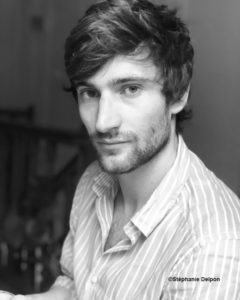
While pursuing a career as a professional ice hockey player, François-Henri Désérable began to write at the age of eighteen, and at the age of twenty-five published his first book with Gallimard editions: Tu montreras ma tête au peuple (You will show my head to the people), who won several literary prizes including that of Vocation. He then wrote Évariste, a fictionalized biography of the mathematics genius Évariste Galois, considered by the magazine Lire as the French revelation of the year 2015, and Un certain M. Piekielny (2017), an investigation into the footsteps of a character mentioned by Romain Gary in La Promesse de l’aube (the promise of dawn). In September 2021, he releases Mon maître et mon vainqueur (my master and my winner) at Gallimard editions.
His project
Book’s theme : Travelogue in Latin America, in the footsteps of Che Guevara
Literary genre : novel
That autumn, interest rates were down, real estate up, my family and friends were worried: wasn’t it time for me to invest into a house ? With a little luck and an indulgent banker I could perhaps get into debt for thirty years, my age at the time. I had neither the means nor the inclination. Signing a bill of sale, I would have felt like signing my own jail register – and seeing my freedom confined to a few square meters. And then an apartment can be furnished; over furniture, I have always preferred my travel bag.
I had just returned to my publisher two hundred and twenty pages of a novel that had kept my life busy for nearly three years, and then left me rich with only my unquiet eyes, prey to doubt and idle. What was I going to do now? I examined my reflection in a mirror: a few wrinkles had appeared at the corners of my eyes; under the eyes, the dark circles had turned blue. My youth was fading away; my bag was full of dust in the back of a cupboard; it was time to leave, without reason or delay. But in which direction ?
It was from Córdoba, Argentina, a day’s drive north-west of Buenos Aires, that on December 29, 1951, Alberto Granado, dit Mial, twenty-nine years old, and his friend Ernesto Guevara, called Fuser, twenty three years-old, left. Their destinations : Argentina – Chile – Peru – Colombia – Venezuela. Their means of transport : a Norton 500cc 1939 called Poderosa II, which means “The Vigorous” – and which of vigorous had only the name. Their goal: to see the country. From this trip, Guevara and Granado had each drawn a story. From these stories, Walter Salles had made a film. Film and stories – in addition to a romantic passion for Che – made me want to follow in their footsteps for 8000 kilometers on motorbike, car, bus or truck. The route was marked out; I just had to follow it. One morning I left. Six months later, I was back. It is this journey through Latin America, in the footsteps of the one who would later become the “Che”, that I would like to relate.
Isabelle Tillerot
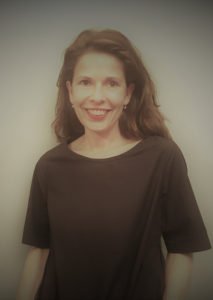
Holder of a doctorate in modern art history, for which she received a two-year Predoctoral Fellowship at the Getty Research Institute in Los Angeles, Isabelle Tillerot teaches art history at the University of California Los Angeles (UCLA), at the University of Lausanne, at the University of Paris X and at The American University of Paris. At the same time, she writes articles and book chapters, directs an issue of Museum International, a review published by UNESCO, participates in the editing of sources and co-publishes exhibition catalogs with Gustave de Staël.
Jean de Jullienne et les collectionneurs de son temps. Un regard singulier sur le tableau (Jean de Jullienne and the collectors of his time. A singular look at the painting), her thesis rewarded in 2005 by the Nicole Prize, awarded by the French Committee of Art History, and in 2007 by the Marianne Roland Michel Prize, awarded by the Fondation Marianne and Roland Michel from the Institut de France, was published in 2010 in the Passages collection of the German Center for the History of Art in Paris, published by the Maison des sciences de l’homme.
Her second book, Orient et ornement. L’espace à l’œuvre ou le lieu de la peinture (Orient and Ornament. The operating space or the painting place), was published by the same editors in 2018 and was selected the following year by “Getty Publications” for an English translation done by Chris Miller. Orient and Ornament, or How the Painting Became an Island will appear in Getty Research Institute Publications in 2022. For the writing of her latest book, she received in 2018 an author grant from the National Book Center. Her third publication in the “Passages” collection appeared in May 2021 under the title Beautés arbitraires. Essai sur l’imagination à l’époque moderne. (Arbitrary beauties. Essay on the imagination in the Modern Age).
Her project
Intended title of her book : L’intrigue du fragment au XVIIIe siècle. Bris et éclats d’une trace (The plot of the fragment in the 18th century. Breaking and shards of a trace)
Literary genre : essay
In its contradictory and insolent truth, the fragment is both general and particular, and entirely specific. This project aims to fill the gap in its history in the 18th century. According to the first edition of the Dictionnaire de l’Académie française in 1694, it is the piece of something that has been smashed, shattered, and little more than considerable things are said. In the figurative sense, it is the tiny part of a text that has disappeared or been incomplete, which was or never was.
But a century later, Montesquieu gives the unfinished fragment the argument of its value and the Encyclopedia considers the literary and philosophical fragment, the fragment of brief forms and thoughts to come, the same as the sketches of the masters of painting. This results in the mysterious status of the fragment, which is in itself the only trace of a piece of work whose purpose was completed or of an interrupted work that has never been anything else but absent.
This is how the term begins to refer to what is essential and to the work in itself. Its paradigms and the remarkable modifications of which it is then the subject show that no fragment is alike, that it is always free to be reinvented and is in reality the touchstone of the imagination of men, the one that allows to apprehend otherness, the unattainable and the unknown.
Maurice Blanchot draws its outlines in the pages he devotes to René Char: “Word of fragment: it is difficult to come close to this word. ‘Fragment’, a noun, but having the force of a verb, however absent: breaking, broken without debris, interruption as speech when the stopping of intermittence does not stop becoming so, but on the contrary provokes it in the rupture which belongs to him ”.
Its relevance to the modern period is that it is never taken for granted, whatever its appearances and reasons for being, and always seems to arise and elude at the crossroads of other intrigues and desires.
Beata Umubyeyi Mairesse
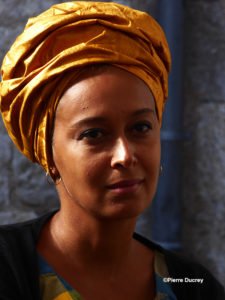
Beata Umubyeyi Mairesse was born in Butare, Rwanda, in 1979. She arrived in France in 1994 after having survived the Tutsi genocide. A graduate in Political Science, she worked for 15 years as a coordinator of health projects, in France and abroad, then entered literature late. She publishes news first, then Ejo followed by Lézardes (lizards) and other short stories, winners of numerous literary awards.
Her first novel Tous tes enfants dispersés (all your scattered children), published in 2019, won the Ethiophile Prize, the Roots and Words Prize, the Bookmark Prize and the “Francophonie” Five Continents Prize (Éd. Autrement & J’ai Lu). She has also published a collection of prose poems: Après le progrès (After Progress).
Her project
Intended title of her book : Le Convoi (the convoy)
Literary genre : novel
I want to write the story of the convoy that saved my life by allowing me to flee Rwanda in 1994. During the genocide against the Tutsi, a Swiss NGO, “Terre des Hommes”, managed to organize some exceptional humanitarian convoys in order to evacuate hundreds of children, mainly Tutsi, allowing them to escape certain death in Butare, my hometown.
Through this story, I would like to pay tribute to the handful of people who performed rare acts of humanity in these times of terror, to preserve the memory of the survivors, but also to tell my long journey to find the traces of some others. What is it to be a survivor? What value do we place on memory? Who tells what, how and when? Who are we saving and why? What possible recognition? What do the records say? So many questions and many more to which I hope to give, if not an answer, at least a perspective, by telling the story of the victims, humanitarian workers and journalists, but also of the genocidal authorities who found themselves in this convoy of 18 June 1994.
Dimitri Bortnikov, Garance Meillon, Geneviève Parot
In 2021, the Fondation des Treilles will welcome Dimitri Bortnikov for 3 months to write a novel that will have as a backdrop the war in Ukraine and will address the issue of the fight between good and evil within man. Garance Meillon will then come for 2 months to write about her personal story, the story of a woman who shifts from adolescence to adulthood, in a world marked more and more strongly by feminism and its various currents. Geneviève Parot will be present in autumn to write a novel on the theme of euthanasia from a societal point of view.
Dimitri Bortnikov
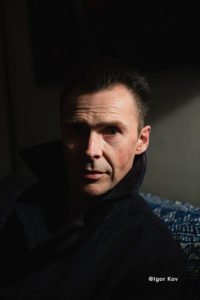
Dimitri was born in 1968 in Samara, Russia. He studied medicine there. He then went near the Arctic Circle to do his military service and began to write in Yakutia. After his military service, he gave up medicine, entered university, where he began studying literature. At the same time, to survive, he has several odd jobs: nurse in a maternity hospital, noise maker on the radio, dance teacher in a recovery house, cook on a Volga boat, and many others…
In 1998, he obtained the prize of the Open Society Foundations of Soros which allowed him to come to France. In 2001, he published his first novel in Russia, the Fritz syndrom, which was translated into French, at Noir sur blanc (Russophonie prize 2011, Libretto, 2011). At the same time, he was working as a cook for a Russian countess.
In 2005, his second novel, Svinobourg, appeared in Russia, and was quickly translated from Russian to French (by Bernard Kreise) at Editions du Seuil.
In 2008, a new novel, Furioso (Musica falsa), was published. In 2011, Repas de morts (Meal of the dead) is his first novel written in French (Allia editions).
In 2012, Dimitri embarked on a crazy project: translating the correspondence of Ivan theTerrible from Slavonic into French. That is, from a dead language to a learned language. Je suis la paix en guerre, Les lettres d’Ivan-le-Terrible (I am peace at war, the letters of Ivan the Terrible), unpublished translation from Slavon, released by Allia the same year.
In 2017, he published Face au Styx (facing the Styx) at Rivages (voted best French novel 2017 by the magazine Lire).
His project
Intended title of the book : Parsifal’s tomb
Literary genre : novel
A Franco-Russian writer engages as a cook alongside “pro-Western” rebels in the war in Ukraine. Armed with a simple ladle, he contemplates war. Becomes the laughing stock of the whole detachment … His war will last only a few months, and this short period will be for him the discovery of the soldier in all his misery disarmed by death and its unexpected splendor. Little by little, he loses his illusions about justice, about the right and the good, about the possibility of man to overcome violence. His best friend is killed, and the writer deserts.
For two years, on foot, in his birth country which has become hostile to him, he tries to return home where he is perceived as an enemy and a traitor. And there begins for him the descent into hell which will be longer and terrifying than any war. He meets human sacrifice. For war becomes a battle within one man, an eternal struggle between good and evil. Throughout his journeys, like an Ulysses, he sees at that moment, in the heart of hell, his intimate Ithaca emerge within him. He sees his own soul, his island in the sea of visions, lies and mirages, in all its nakedness, illuminated without being blinded, without any shadow, the truth of every life. He understands that nothing can stop life and fate. The only thing a man can do to remain a man is to love his destiny.
Garance Meillon

After studying literature, Garance Meillon flew to California, where she earned a Bachelor’s degree in Screenplay & Directing from Chapman University. Back in France, she carried out development missions with feature film production companies.
In January 2016, she published her first novel, Une famille normale (a normal family) at Fayard, which appeared in Folio the following year and won the Literary creation support Prize from the Simone and Cino del Duca Foundation (Institut de France). In 2018, her second novel, La douleur fantôme (the Phantom Pain)(Fayard), was published, a book bordering on the fantastic, inspired by her memories in Los Angeles.
At the same time, she continued her film projects and co-wrote with Romain Compingt the feature-length screenplay J’arrive (I am coming), which won the CNC Rewriting Aid and Atelier Grand Nord (Quebec), and which she is currently developing. She is also working on several serial projects, one of which won the CNC’s Innovation Fund.
Her third novel, Les corps insolubles (the insoluble bodies), was published in January 2021 by Gallimard.
Her project
Intended title of the book : chronique d’une tachycardie (chronicle of a tachycardia)
Literary genre : novel
“It all started with a realization: ‘I rarely went out with boys because I wanted them. Almost every time I went out with them it was because it was a story I could tell myself. ” In my thirties, I realized that I had experienced stories with men precisely for this: to turn these physical adventures into stories, so that actions would later be translated into words. Paradoxical as it may seem, I live less to live than to tell.
So I decided to do the chronological examination of my sentimental life, a simple, linear method, which nevertheless let me glimpse not only the emotional mechanics which are always at work, and which always push me to want “better than that ”, but also to what extent my relationship with my body changes with the times, which also changes: between the 2000’s (time of my first significant relationships) and today, the point of view on women has changed considerably.
Through my personal history, through my body as a woman among so many others, I would like to attempt a dissection – quite subjective – of a female body over time. A female body which, unlike that which is often put forward in the media, in the cinema or on television, would not be murdered, nor raped, camouflaged, hypersexualized or exhibited: simply, tell, with the hindsight that offers literature, the bodily story of a woman of generation Y, who shifts from adolescence to adulthood, in a world marked more and more strongly by feminism and all its currents. Men go through her life and this woman thinks she remains the same, but her point of view on her body changes, at the same time that morals, imperceptibly, also change – so much so that she ends up carrying the mark on her. In short, I would like to take myself as an object of study in order to realize this sentimental and physical history, which will be both intimate and, I hope, universal. ”
Geneviève Parot
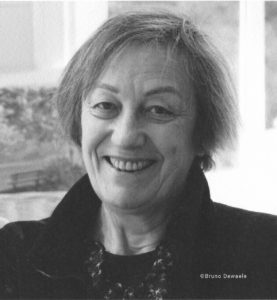
During her literary studies, Geneviève Parot met her first passion: the theater. In the effervescence of the 1970s, she became fully involved in the collective adventure of this “total art”, within several companies in the regions. From Fassbinder to Marguerite Duras, from Brecht to Corneille, Molière or Musset, from improvisation to alexandrine, she was also confronted with assistantship and directing, writing scenarios and songs, the adaptation of texts, such as “La portereuse de pain” (the bread carrier) by Xavier de Montépin.
She designed and co-produced two radio series for Radio France: “Victor Hugo and Doctor Lachamp” in 1985 and “The Almanac of the Four Seasons” after Alexandre Vialatte in 1986.
At the end of the 80s, she changed environment, became an editor in institutional communication, with as main file in charge the television magazine MASSIF co-produced by FR3 and DATAR and directed by Laurent Bignolas. It was during this period that writing – this time personal – came to her as a resurgence of the need to create. She first wrote short stories (about sixty of which ten were published and one was adapted for the screen), then novels :
Trois soeurs, un long silence (Three sisters, a long silence) (Editions Gallimard, collection Blanche, 2005)
La folie des solitudes (Loneliness craziness) (Editions Gallimard, collection Blanche, 2009)
As well as a travelogue: Neapolis, in “Le Journal des Lointains” (Editions Buchet-Chastel, 2008).
At the same time, she happily rediscovered dramatic art: in 1996 she created the theater specialty teaching at the Lycée Eugène Jamot in Aubusson (Creuse region), in partnership with the Scène Nationale-Théâtre Jean Lurçat, where she taught until 2018.
Since then she has devoted herself entirely to writing.
Her project
Literary genre : novel
Today, in so-called “developed” societies, while transhumanism dreams of making us eternal and the inversion of the age pyramid is becoming a global problem, how do we view the limited time of human life? How do we see the future and fit in with the next generations? How react or could react our societies, our States, how do they or could they treat the “problem”? How far can the logic of our systems go? Towards what dead ends or what changes?
This fiction will be situated in the near future, between dystopia and farce: the burden represented by the cohort of inactive and unproductive (but not dependent) elderly people, experienced as a “bottomless pit”, has become unbearable. Tensions are growing between generations, economic indicators are red, gene therapies “threaten” to further extend life expectancy. A remedy must be found for this explosive situation.
A new concept has germinated in the circles of power, developed by expert advisers in economics, assisted by expert advisers in sociology, psychology, geriatrics, philosophy… It is the concept of training for voluntary departure, described as ” great humanitarian cause ”. This concept led to the creation of a tool to implement it: the Establishment of Dignified Departure, or E.E.D.D. The goal is to get people to consider, then accept and then desire their own demise. These E.E.D.D. multiply, and meet with growing success. It is in one of these establishments that the action will take place.
Clément Bénech, Laurence Lacour, Sophie Divry
In 2020, the Fondation des Treilles is welcoming Clément Benech for 3 months to write a novel dealing with belonging which will incorporate visual elements into the story. Laurence Lacour will also be there for 3 months, to work on a love story that takes place in Northern Ireland, with the development of the peace process now threatened by Brexit as a background to her novel. Sophie Divry will be hosted at the foundation for 2 months.
CLÉMENT BENECH
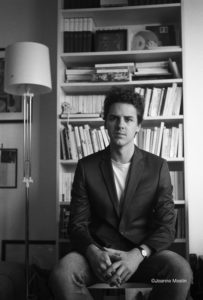 Clément Bénech was born in Paris in 1991. After a scientific high school diploma, he studied German, French literature and publishing in Paris, Bordeaux and Berlin. He occasionally writes in the press : “Libération”, “ArtPassions”, especially on painting and photography. In parallel, he writes novels. L’été slovène (the Slovenian summer) was published in 2013 by Flammarion, then Lève-toi et charme (get up and charm) in 2015, and finally Un amour espion (a spy love) in 2017. The latter earned him the following year’s selection among the “new enlighteners”, or “30 French under 30 who will make the France of tommorrow ” from Vanity Fair magazine. In 2019, he published an essay, Une fragilité essentielle, le roman à l’ère de l’image (an essential fragility, the place of the novel in the age of image), published at “Plein Jour”, which earned him his first literary prize : the Khôra-Institut de France prize for the 2019 literary essay. He wishes to take advantage of his stay at the Treilles foundation to write a new novel, which will extend his formal research on the incorporation of visual elements into the romantic space, and will relate to concepts as varied as belonging, umbrellas, education and heart prosthesis.
Clément Bénech was born in Paris in 1991. After a scientific high school diploma, he studied German, French literature and publishing in Paris, Bordeaux and Berlin. He occasionally writes in the press : “Libération”, “ArtPassions”, especially on painting and photography. In parallel, he writes novels. L’été slovène (the Slovenian summer) was published in 2013 by Flammarion, then Lève-toi et charme (get up and charm) in 2015, and finally Un amour espion (a spy love) in 2017. The latter earned him the following year’s selection among the “new enlighteners”, or “30 French under 30 who will make the France of tommorrow ” from Vanity Fair magazine. In 2019, he published an essay, Une fragilité essentielle, le roman à l’ère de l’image (an essential fragility, the place of the novel in the age of image), published at “Plein Jour”, which earned him his first literary prize : the Khôra-Institut de France prize for the 2019 literary essay. He wishes to take advantage of his stay at the Treilles foundation to write a new novel, which will extend his formal research on the incorporation of visual elements into the romantic space, and will relate to concepts as varied as belonging, umbrellas, education and heart prosthesis.
His project
“Where Jeanne Popescu belongs or Made in France” (final title : a real change of scenery)
If you asked her, Jeanne Popescu would undoubtedly answer like the little girl she is: “My name is Jeanne, I am ten years old, I live in Olliergues (63), I was born in Clermont-Ferrand in 1998, I like to play jump rope with my friends, draw horses and play Nintendogs on my DS. My dad works at the Aurillac umbrella factory and my mom is a caregiver. ”
But Jeanne’ simple life will cross the path of a comet, in the person of a young teacher, Romain Pécuchard. This Parisian, fresh out of his school of pedagogy, finds himself parachuted in the remote village where Jeanne lives. Very ambitious and eager to revolutionize education as a whole, he will aim at making the little girl – in whom he sees the embodiment of exoticism – a new “Emile” (character of Rousseau’s masterpiece on the education and training of the young). For Jeanne, this meeting will be the starting point of an identity questioning that will take different forms in her teenage years, from couples to charities involvement, by way of new kinds of belonging created by virtual networks.
Besides its subject (belonging), and the three main areas which constitute its pillars, the novel will also continue the formal adventure in which Clément embarked on his second book, that consists in inserting images within the narrative.
Laurence Lacour
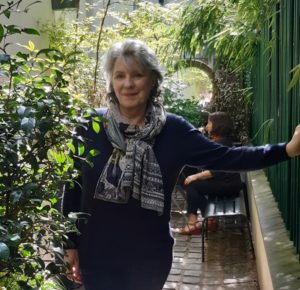 Laurence Lacour was born in 1957 in Orléans, on the banks of the Loire river, “the last wild river in Europe!”. Driven by an early vocation as a journalist, she trained in the demanding school of regional daily press (newspaper and radio), before joining the Europe 1 radio in 1983. As a special correspondent in the East of France, she accompanied the changes of the 80’s in regions in crisis. In Lorraine, she followed the economic and social collapse of the major industries: coal, steel, textiles, and in Strasbourg, the emergence of today’s Europe (Single Act, enlargement, Franco-German couple, etc.)
Laurence Lacour was born in 1957 in Orléans, on the banks of the Loire river, “the last wild river in Europe!”. Driven by an early vocation as a journalist, she trained in the demanding school of regional daily press (newspaper and radio), before joining the Europe 1 radio in 1983. As a special correspondent in the East of France, she accompanied the changes of the 80’s in regions in crisis. In Lorraine, she followed the economic and social collapse of the major industries: coal, steel, textiles, and in Strasbourg, the emergence of today’s Europe (Single Act, enlargement, Franco-German couple, etc.)
But it was the resounding “Grégory affair” (a murdered child investigation), which arose in the Vosges region, that upset her passionate relationship with her job. Shocked by the numerous media and judicial abuses, she resigned to denounce them in a work that has become a reference, Le bûcher des innocents (The innocents bonfire), edited by Plon, les Arènes. She continued her study of the 80’s by autopsying the case of contaminated blood in Le chant sacré (sacred song) published at Stock editions.
Finally, the confession of a long hike, winter and solitary, towards Saint-Jacques-de-Compostelle allowed her to publish a very intimate work, Tout homme est homme (every man is a man) by Bayard publishers. Her three months of residence at the Treilles will allow her to go back again to these crucial years by plunging, in romantic form, into the Troubles of Northern Ireland and a passionate love with, in background, the development of the peace process now threatened by Brexit. “The 80’s years keep on fascinating me. Restoring them allows me to get to know myself even better.”
Her project
“The fabric of heaven”
1989 – The novel is about a passionate love correspondence during the civil war between Catholics and Protestants in Northern Ireland. This conflict, complex, opposing religious and political convictions, with purely British and international issues, serves above all as a backdrop for the expression of the two characters. The story is first of all that of two beings at opposite ends of each other called to become fusional. The novel has neither narrator nor dialogues and is based only on their letters.
Kiara, a 31-year-old nurse, treats wounded from both sides in the Royal Victoria hospital In Belfast. At the end of 1988, she attends a funeral with her father, a British Army officer.
They meet a famous 65-year-old lawyer, Pat O’ Mahony, a Dublin-based human rights activist. Emma had already seen him one year earlier at the soldiers’ bedside, imploring them to stop fighting. That same evening, she revives these memorable memories in a long letter. Moved, the lawyer invites her to his office and from the outset, everyone understands that, despite what separates them (age, social condition), the essentials will unite them. Separated by the invisible border between Belfast and Dublin, they start a correspondence, soon passionate, kept secret, in which they question their meeting and then their feelings. Without ever seeing each other again, each illuminates the life of the other. Together, they manage to realize the impossible, to weave the fabric of heaven. However, politics and weapons, always ambushed, will eventually catch up with them.
Sophie Divry
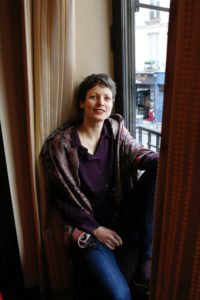
Born in 1979 in Montpellier, Sophie Divry studied political science. She worked as a journalist for the newspaper “La Décroissance” (the decrease) before devoting herself to writing. She published her first novel, La Cote 400 in 2010. She is notably the author of La condition pavillonnaire (the suburbia condition), Trois fois la fin du monde (three times the end of the world) and the essay Réouvrir le roman (Reopening the novel). Her work has been published by Notabilia editions. She currently lives in Lyon.
Her project
The initial idea is to make the rover “Curiosity”, the NASA rolling laboratory on the surface of Mars since 2012 – and partly directed from Toulouse – the hero of her novel. A rover that escapes human control, and walks at will in Mars, which greatly disturbs engineers, and that will make the reader smile, because the idea is as much to have fun with the power of fiction, as ‘to reflect on science and the will to rule’. Sophie has already made objects speak in When the devil came out of the bathroom, like Lewis Caroll in Alice in Wonderland. In this upcoming novel, she imagines rovers and orbiters camping out real characters, or even engaging in chases (there are six orbiters who are currently circling Mars, photographing up to 10 cm close to the surface). “I want to write a kind of “Martian fantasy”. That said, the share of science fiction will be quite low: on the one hand I do not like its soothing technical descriptions, on the other hand it is enough to tell what men are doing on Mars today to feel like we’re already in science fiction. In my latest novel, “Three times the end of the world”, I did what some people call “nature writing” (although I do not like these terms.) But it will be a question here of describing the Martian nature, that is to say an icy desert, such an old desert that it is rusty, and of which orbiters have taken extraordinary shots, it is a perfect romantic frame…and yet real. It is rather stimulating for a writer to describe Mars: we do not question it, but most of the landscapes that we read about in literature are, in fact, terrestrial landscapes. Everything about Mars remains to be written. “
Violaine Bérot, Eddie Breuil and Spyridon Tegos
in 2019 The Fondation des Treilles has welcomed Violaine Bérot, during 3 months, for the writing of a fiction which questions : the relation of the contemporary man with the nature and the animals, of life on the margin of the consumerist society, of mutual assistance but also the collapse of our industrial civilization. Eddie Breuil, also present for 3 months, worked on an essay on poetry critics, and Spyridon Tegos, during 2 months, wrote an essay on the main currents of the Enlightenment concerning the Civility operated by the thought of Adam Smith and its reception in France in the late Enlightenment.
VIOLAINE BÉROT
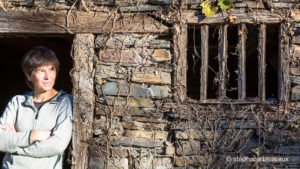 Violaine Bérot was born in 1967 in the heart of the Pyrenean mountains. Life and writing have always been intertwined in her career. From her woman’s body she writes about feelings, emotions, intuitions. Her novel Tombée des Nues (Fallen from the clouds) edited by Buchet-Chastel in 2018, tells through the voices of seven characters the upheaval provoked in a small village community by the birth of an unexpected child. A few years lost in the city, this girl of nature has quickly returned to her sources. Abandoning modernity and growth against a sober life, she has been experimenting for 20 years with living in the margins of our contemporary world. Her current novel project will be about these concerns. The three months of residency at the Fondation des Treilles have allowed her to continue a work initiated in Switzerland at the Michalski Foundation in which she started to discuss about the relationship of the contemporary man to nature and animals, living on the margins of the consumer society, of mutual aid but also of collapse of our industrial civilization.
Violaine Bérot was born in 1967 in the heart of the Pyrenean mountains. Life and writing have always been intertwined in her career. From her woman’s body she writes about feelings, emotions, intuitions. Her novel Tombée des Nues (Fallen from the clouds) edited by Buchet-Chastel in 2018, tells through the voices of seven characters the upheaval provoked in a small village community by the birth of an unexpected child. A few years lost in the city, this girl of nature has quickly returned to her sources. Abandoning modernity and growth against a sober life, she has been experimenting for 20 years with living in the margins of our contemporary world. Her current novel project will be about these concerns. The three months of residency at the Fondation des Treilles have allowed her to continue a work initiated in Switzerland at the Michalski Foundation in which she started to discuss about the relationship of the contemporary man to nature and animals, living on the margins of the consumer society, of mutual aid but also of collapse of our industrial civilization.
“The blank pages I fill are just the beginnings of my future texts. Writing for me is especially what comes after the first roll. To write is to erase, to scratch, to reformulate, to throw, to reread, to listen, to begin again. It’s gnawing the bone to reach the marrow. “
Eddie Breuil
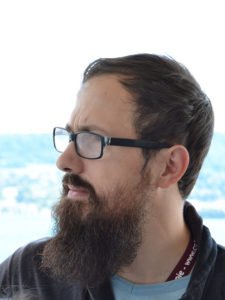 The Fondation des Treilles hosted Eddie Breuil in 2019, also for three months, for a poetry critics essay.
The Fondation des Treilles hosted Eddie Breuil in 2019, also for three months, for a poetry critics essay.
Eddie was born in Vénissieux. He supported a doctoral thesis with the jury’s congratulations in 2015 on the subject “History and theories of critical edition of modern texts” under the direction of Philippe Régnier. A revised version is to be published by Garnier publishing under the title Methods and practices of the critical edition of modern texts. Holder of the Secondary School teaching diploma of Modern Literature, he teaches French and literature at the Universities of Guadeloupe and Seville, IUT2 Grenoble, ESPE Bordeaux, high school and several colleges REP.
We owe him a decisive research work Du Nouveau chez Rimbaud (News at Rimbaud’s), edited by Honoré Champion, obliging to reassign many texts neither signed nor claimed and hastily attributed to Arthur Rimbaud, especially the prose texts traditionally compiled under the title Illuminations.
Since 2016, he has been a member of the editorial board of the Nouvelle Quinzaine littéraire, today Quinzaines. He is preparing a synoptic edition of the complete works of Isidore Ducasse. Finally, He is also interested in the cultural dimension of chess.
During his residency at the Fondation des Treilles, he focused on the links between sensitivity and aesthetics.
Spyridon Tegos
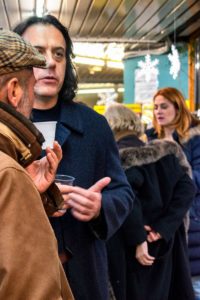 Spyridon Tegos is assistant professor of modern philosophy at the University of Crete, Greece. He has made research trips to Scotland (Institute for Advanced Studies in the Humanities, Edinburgh), the USA (Harvard, Princeton) and France as visiting professor (E.N.S. Lyon, Paris II Pantheon-Assas, E.H.E.S.S Paris). His research project focused on a genealogy of social feelings in modernity, particularly with regard to manners and customs in the Scottish and French Enlightenment. He is also interested in the development of a philosophical anthropology at the intersection of the history of philosophy, the history of ideas and the social sciences.
Spyridon Tegos is assistant professor of modern philosophy at the University of Crete, Greece. He has made research trips to Scotland (Institute for Advanced Studies in the Humanities, Edinburgh), the USA (Harvard, Princeton) and France as visiting professor (E.N.S. Lyon, Paris II Pantheon-Assas, E.H.E.S.S Paris). His research project focused on a genealogy of social feelings in modernity, particularly with regard to manners and customs in the Scottish and French Enlightenment. He is also interested in the development of a philosophical anthropology at the intersection of the history of philosophy, the history of ideas and the social sciences.
During his stay he wrote an essay on the main trends of the Enlightenment concerning civility and its reception in France in the Enlightenment, before and after the Revolution, as part of a genealogy of the ways of the middle class in Europe.
Louis-Philippe Dalembert, Olivier Dhénin and Michaël Ferrier
The Fondation des Treilles welcomed in 2018 Louis-Philippe Dalembert, for 4 months, for a novel on South-North migration; Olivier Dhenin, for 2 months, for the completion of his trilogy The Ordeal ; Michaël Ferrier, also for 2 months, for the writing of an essay on what he calls « furtive disasters».
Louis-Philippe Dalembert
 Louis-Philippe Dalembert was born in Port-au-Prince, Haiti. Poet, novelist and essayist, he lived alternately in Port-au-Prince, Nancy, Paris, Rome, Jerusalem, Florence, Berlin, Milwaukee, Bern, and traveled wherever his footsteps could carry him … in the ever-renewed echo of his native land. Former resident of the Villa Medicis in Rome, Knight of Arts and Letters, his work has won several awards including the Berliner Künstlerprogramm DAAD, Orange Book Award 2017, he was a finalist of the Medicis Prize and of the French Academy Novel Grand Prix in 2017 … His books are translated into German, Italian, Spanish, Portuguese, English, Danish, Serbian … Louis-Philippe Dalembert is also a graduate of the Ecole Normale Supérieure in Port-au-Prince, of the Paris Graduate School of Journalism and is the author of a doctoral thesis in Comparative Literature on the Cuban writer Alejo Carpentier (University of Paris III-Sorbonne Nouvelle). His latest works published are : Avant que les ombres s’effacent (before the shadows fade), Sabine Wespieser, 2017, Ballade d’un amour inachevé (ballad of an unfinished love), Mercure de France, 2013, En marche sur la terre (walking on the ground), poetry, Bruno Doucey, 2017. Louis-Philippe Dalembert, who writes in the two languages of his native country: French and Creole, lives today between Paris, Port-au-Prince and elsewhere. During his residency, he worked on a novel about migrants : Mur Méditerranée (the Mediterranean wall), published by Sabine Wespieser in 2018, which won the French Language Prize 2019.
Louis-Philippe Dalembert was born in Port-au-Prince, Haiti. Poet, novelist and essayist, he lived alternately in Port-au-Prince, Nancy, Paris, Rome, Jerusalem, Florence, Berlin, Milwaukee, Bern, and traveled wherever his footsteps could carry him … in the ever-renewed echo of his native land. Former resident of the Villa Medicis in Rome, Knight of Arts and Letters, his work has won several awards including the Berliner Künstlerprogramm DAAD, Orange Book Award 2017, he was a finalist of the Medicis Prize and of the French Academy Novel Grand Prix in 2017 … His books are translated into German, Italian, Spanish, Portuguese, English, Danish, Serbian … Louis-Philippe Dalembert is also a graduate of the Ecole Normale Supérieure in Port-au-Prince, of the Paris Graduate School of Journalism and is the author of a doctoral thesis in Comparative Literature on the Cuban writer Alejo Carpentier (University of Paris III-Sorbonne Nouvelle). His latest works published are : Avant que les ombres s’effacent (before the shadows fade), Sabine Wespieser, 2017, Ballade d’un amour inachevé (ballad of an unfinished love), Mercure de France, 2013, En marche sur la terre (walking on the ground), poetry, Bruno Doucey, 2017. Louis-Philippe Dalembert, who writes in the two languages of his native country: French and Creole, lives today between Paris, Port-au-Prince and elsewhere. During his residency, he worked on a novel about migrants : Mur Méditerranée (the Mediterranean wall), published by Sabine Wespieser in 2018, which won the French Language Prize 2019.
Olivier Dhénin
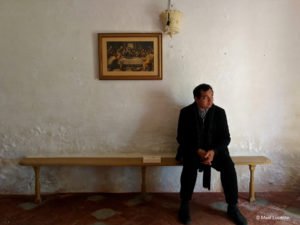 Poet, playwright and director, Olivier Dhénin shares his life between Paris and Rochefort, and previously lived in New York and Rome. Born from a Saïgonnese mother and a father from Arrage who died when he was a teenager, he approaches writing and theater as the place of being, memory and escape. Alongside studies of literature at the University of Paris VII, he pursued a musical training at the National Conservatory of Amiens which lead him to the artistic coordination of the Théâtre du Châtelet from 2006 to 2008. He then created his theater company and an opera: Winterreise with which he starred Maeterlinck, Rilke, Mahler, Britten, Debussy and recently Reynaldo Hahn’s Dream Island at the Athénée Théâtre Louis-Jouvet in Paris, and Ravel’s L’Enfant et les Sortilèges (the child and spells) at the Théâtre de la Coupe d’Or in Rochefort. His literary work is essentially theatrical: after Ellénore, a lyric drama inspired by “Sturm und Drang”, he writes Andreas / Maelström after Hans Christian Andersen, Ricercare, Cendres (ashes), les Feuillets d’Audelin (Audelin’s notebook), La Cantate de Tristan de Loonois. The work of Alain-Fournier is the subject of several rewritings to form a triptych to be played on stage : La Fête étrange (the strange feast), Les Gens du Domaine sans nom (the people of the unnamed domain), Le Pays en hiver (the country in winter), whose first version was created for the National Celebrations of Le Grand Meaulnes centennial in 2013. Cordelia-requiescat after King Lear was written for the “Spring of Poets” and performed at the Belleville Theater for Shakespeare’s 400th Anniversary in 2016.
Poet, playwright and director, Olivier Dhénin shares his life between Paris and Rochefort, and previously lived in New York and Rome. Born from a Saïgonnese mother and a father from Arrage who died when he was a teenager, he approaches writing and theater as the place of being, memory and escape. Alongside studies of literature at the University of Paris VII, he pursued a musical training at the National Conservatory of Amiens which lead him to the artistic coordination of the Théâtre du Châtelet from 2006 to 2008. He then created his theater company and an opera: Winterreise with which he starred Maeterlinck, Rilke, Mahler, Britten, Debussy and recently Reynaldo Hahn’s Dream Island at the Athénée Théâtre Louis-Jouvet in Paris, and Ravel’s L’Enfant et les Sortilèges (the child and spells) at the Théâtre de la Coupe d’Or in Rochefort. His literary work is essentially theatrical: after Ellénore, a lyric drama inspired by “Sturm und Drang”, he writes Andreas / Maelström after Hans Christian Andersen, Ricercare, Cendres (ashes), les Feuillets d’Audelin (Audelin’s notebook), La Cantate de Tristan de Loonois. The work of Alain-Fournier is the subject of several rewritings to form a triptych to be played on stage : La Fête étrange (the strange feast), Les Gens du Domaine sans nom (the people of the unnamed domain), Le Pays en hiver (the country in winter), whose first version was created for the National Celebrations of Le Grand Meaulnes centennial in 2013. Cordelia-requiescat after King Lear was written for the “Spring of Poets” and performed at the Belleville Theater for Shakespeare’s 400th Anniversary in 2016.
Two trips to the Arctic in 2013 and 2014 give rise to a reflection on the unknown and the quest for elsewhere through Unalaska, narrative / prose / poetry. A poetic tomb unpublished in memory of his father disappeared in 2000 is initiated during a trip to Moscow in 2011 and completed in Delft in 2013.
In 2015, a collection of Psalms Le livre de l’heure de Aaron Däsler (the book of Aaron Däsler’s time), is published by “les Petites Allées”. In 2016, Olivier Dhénin is resident at the Villa Médicis – Académie de France in Rome. During his residency at Treilles, Olivier Dhénin has worked on the completion of the third part of his trilogy L’Ordalie, a family trilogy in which each part is separated by ten years. The first part, Ricercare, is the central piece. The second, Cendres (Ashes), takes place ten years before; the third, Waldstein, ten years later. This elapsed time aims to follow the evolution of characters confronted with tragedy.
He also used the time spent in residence to create an exhibition: “L’atelier d’Olivier Dhénin”. [link to the exhibition]
Michael Ferrier
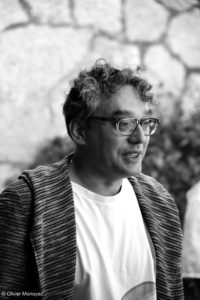 Michaël Ferrier was born in Strasbourg. He spent his childhood in Africa (Chad, Cameroon, Niger) and in the Indian Ocean (Madagascar, Réunion, Mauritius), where his father’s family is from. After studying at the Ecole Normale Supérieure, he obtained an Agrégation of Literature and a doctorate on La Chanson dans l’oeuvre de Céline (The song in Celine’s work) from Grand Opera to popular songs, via operetta, comic opera, light-comic opera, fairy and other youthful indiscretions …of the musicality that the celinian poetics gives to the sung forms” (Ed. Lérot, 2004). He then went to Japan where he has become professor at the Chuo University of Tokyo and directs the “Figures de l’Etranger” Research Centre on representations of otherness in contemporary societies.
Michaël Ferrier was born in Strasbourg. He spent his childhood in Africa (Chad, Cameroon, Niger) and in the Indian Ocean (Madagascar, Réunion, Mauritius), where his father’s family is from. After studying at the Ecole Normale Supérieure, he obtained an Agrégation of Literature and a doctorate on La Chanson dans l’oeuvre de Céline (The song in Celine’s work) from Grand Opera to popular songs, via operetta, comic opera, light-comic opera, fairy and other youthful indiscretions …of the musicality that the celinian poetics gives to the sung forms” (Ed. Lérot, 2004). He then went to Japan where he has become professor at the Chuo University of Tokyo and directs the “Figures de l’Etranger” Research Centre on representations of otherness in contemporary societies.
Novelist and essayist, he has published : Tokyo, petits portraits de l’Aube (Tokyo, small portraits at dawn) in 2004, Sympathie pour le fantôme (Sympathy for the Ghost) in 2010, which earned him the literary prize of the Golden Gate, Fukushima, récit d’un désastre (Fukushima, story of a disaster), which obtained the Edouard Glissant Prize 2012, Mémoires d’Outre-Mer (Overseas Memories), that won the Franz-Hessel Prize 2015, and finally François, portrait d’un absent (François, portrait of an absent), which won the Décembre Prize 2018. They were all published by Gallimard.
During his residency at Les Treilles, Michael Ferrier worked on an essay on what he calls “stealth disasters”, disasters that are not spectacular and have a very specific temporality regime (for example : radioactive contamination), which nowadays burst into epistemological frameworks that have not been thought out for them and are ill-configured to apprehend them. He also started to write a novel : Scrabble, in which he talks about his childhood in Chad, Africa, and his – almost simultaneous – discovery of war and writing. The book was published by Mercure de France and was selected for the Renaudot, the Femina and the Medicis Prizes 2019.
Benjamin Pelletier, Emmanuel Ruben, Pascale Roze
The Fondation des Treilles welcomed in 2017 Benjamin Pelletier for a 3 month residency for a novel proposing a literary exploration of childhood, Emmanuel Ruben also for a 3 month residency for a fiction on the discovery of the History of France and of Europe, Pascale Roze for 2 months to write a novel.
BENJAMIN PELLETIER
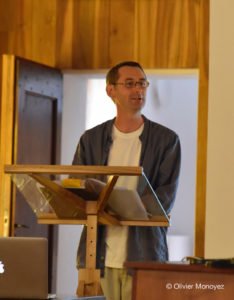 The Editions de l’Olivier published his first two books : La Mère des batailles (the mother of battles) in 2004 and A travers sables (through sands) in 2009. His following book, Toujours plus à l’Est (still further to the East), published by Picquier editions in 2016, is inspired by his different stays in South Korea. Benjamin Pelletier was born in 1975. After studying philosophy in Toulouse, he taught French language and culture in Saudi Arabia and South Korea. He then followed a Master’s degree in economic intelligence and worked for different companies before specializing in intercultural management training. He also teaches this approach in many schools and intervenes regularly as a conference speaker.
The Editions de l’Olivier published his first two books : La Mère des batailles (the mother of battles) in 2004 and A travers sables (through sands) in 2009. His following book, Toujours plus à l’Est (still further to the East), published by Picquier editions in 2016, is inspired by his different stays in South Korea. Benjamin Pelletier was born in 1975. After studying philosophy in Toulouse, he taught French language and culture in Saudi Arabia and South Korea. He then followed a Master’s degree in economic intelligence and worked for different companies before specializing in intercultural management training. He also teaches this approach in many schools and intervenes regularly as a conference speaker.
The project he carried at Les Treilles aimed at exploring childhood through a learning story, by avoiding the nostalgia of lost paradise, the self-centered confession of intimacy, or the pathos of family drama. It is rather about the ordinary and anonymous childhood that accompanies us and lasts a lifetime, of “childhood found at will” dear to Baudelaire or of this “permanent childhood” that Gaston Bachelard places at the heart of the dynamism of poetry.
EMMANUEL RUBEN
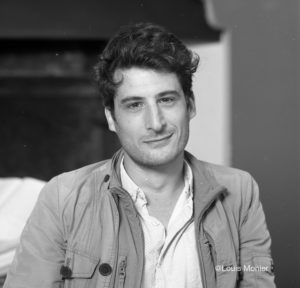 Emmanuel Ruben was born in 1980 in Lyon. He was a student of the “École Normale Supérieure” and of INALCO (National Institute of Eastern Languages and Civilisations). He obtained an aggregation of geography, made numerous trips to Eastern Europe and the Middle East.
Emmanuel Ruben was born in 1980 in Lyon. He was a student of the “École Normale Supérieure” and of INALCO (National Institute of Eastern Languages and Civilisations). He obtained an aggregation of geography, made numerous trips to Eastern Europe and the Middle East.
He is the author of a dozen books – geopolitical novels, travel stories, essays at the intersection of the arts, literature and geography – which question the borders of Europe in landscapes as well as on maps. In September 2014, his novel La Ligne des glaces (the ice line) published by Payot & Rivages, the first episode of a European series, was selected for the Goncourt prize.
In June 2016, he embarked on a crossing of Europe by bicycle, from Odessa to Strasbourg. Sur la route du Danube (on the Danube road), edited by Payot & Rivages, a book inspired by this crossing, won the Nicolas-Bouvier Prize, the Amerigo-Vespucci Prize, and the Sport & Literature Grand Prize in 2019. Since September 2017, he has been running the Maison Julien Gracq, a cultural place located on the banks of the Loire, between Nantes and Angers, which welcomes writers from around the world.
PASCALE ROZE
Pascale Roze was born in Vietnam in 1954. Her father was a naval officer and her mother came from a family established in trade with Indochina. Her grandfather lived twenty years in Cochin China. He was mayor of Cholon.
She studied in France Literature and Theater. From 1983 to 1993, she worked with the director Gabriel Garran at the Théâtre de la Commune in Aubervilliers and at the Théâtre international de langue française, which promotes the French repertoire.
She published her first book in 1994, a collection of short stories entitled Histoires dérangées (Disturbed Stories), where you can feel the influence of Marguerite Duras.
Since then, she has devoted herself to writing and to the animation of workshops in schools, professional environment, jails. In 1996, her first novel, Le Chasseur Zéro (The Zero Hunter), won the First Novel Prize and the Goncourt Prize. She then publishes two other novels: Ferraille (Metal) and Parle-moi (Talk to me), two stories: Lettre d’été (Summer Letter), meditation letter addressed to Leo Tolstoy and Un homme sans larmes (A man without tears), intimate dialogue with the epicurean poet Horace, L’Eau rouge (Red water), a novel located in the Indochina War, Itsik, a novel about the life and death of a Polish Jew during the Second World War, Aujourd’hui les cœurs se desserrent (Today the hearts are light), then Passage de l’amour (Passage of love), in which she made subtle variations on love through short stories punctuated by a couple’s struggle against illness and finally Lonely Child. The clash between personal destiny and History is one of her inspiration themes.
She has held for a long time a chronicle on the foreign literary news on France-Inter (until June 2010) in the show of Paula Jacques, Cosmopolitan.
Pascale Roze shares her life between Paris and a small village in Burgundy. Her book, La Belle Hélène, was published in 2020 by Stock Editions. She recounts the life of Hélène Bourguignon, professor at the Political Sciences School, widow, free, lonely and bright, and evokes places: Paris, Burgundy, Corsica …
Catherine Mary, Kettly Mars, Nils Trede
The Fondation des Treilles welcomed in 2016 Catherine Mary, for an autobiographical novel about the rediscovery of her family history, Kettly Mars, for a novel on the theme of political satire in the Haitian society, and Nils Trede, for an inspired fiction by the biotechnological process of reprogramming a differentiated cell into a pluripotent stem cell.
CATHERINE MARY
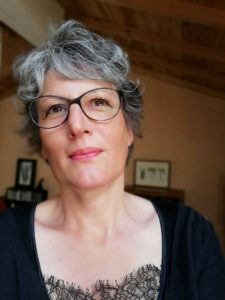
Catherine Mary is a journalist and writer. At the centre of her reflection is the question of the minority point of view made invisible by the norm of a social group, with an underlying thread the political question of the coexistence of narratives. Since 2012, she has regularly contributed to the “Science and Medicine” supplement to the newspaper Le Monde and to the newspaper Le Temps (Switzerland).
A doctor in virology, and also a graduate in art history, she is interested in the way in which scientific knowledge is constructed and used in the contemporary world. She deals with subjects related to the definition of madness, bioethics, or subjects on the border between art, science, anthropology or philosophy. In Craie et tableau noir, matières à penser (chalk and blackboard, matters to think about), Le Monde, 2014, she probed the relationship of mathematicians to the blackboard to understand the function of this iconic object in mathematical creation.
In L’habit en psychiatrie (the dress in psychiatry), a reflection of our hesitations (Le Temps, 2016), she explores the link between the dress of the madman and the representations of madness. In Race : la génétique face à ses démons (Race: genetics facing its demons), Le Monde, 2018, she probes the unthinkable of the discourse of contemporary genetics to reveal the way in which they contribute to the rebiologization of the concept of race.
She has also worked in public health for a long time, as an epidemic control policy analyst. Following the H1N1 flu pandemic, she alerted in particular to the risk for democracies of the loss of confidence in medical experts, in two forums published in Le Monde. She is also the author in 2011, of a reference portrait of the infectious disease specialist Didier Raoult. As a writer, she is the author of Le Gros (the Big), Color Gang 2011. She was the winner of the Author’s Residency Prize for 2016 for an autofiction exploring the theme of domestic violence and sectarian hold. Combining investigation, exploration of her family memory and work on her traumatic memory, she questions the sources of violence within the family, in a context of sectarian recruitment.
KETTLY MARS
 Kettly Mars was born and lives in Port-au-Prince, Haiti. She is recognized as one of the most read Haitian writers, with her novels often plunging into extremely controversial worlds but which are nevertheless at the heart of Haiti’s past and present. She explores in her novels, short stories and serials the many facets of her country and the contradictions of her singular history. After a career of more than thirty years in the high-level administration in Haïti, she now devotes herself entirely to writing. She participates in cultural events and collective publications in Haiti and abroad.
Kettly Mars was born and lives in Port-au-Prince, Haiti. She is recognized as one of the most read Haitian writers, with her novels often plunging into extremely controversial worlds but which are nevertheless at the heart of Haiti’s past and present. She explores in her novels, short stories and serials the many facets of her country and the contradictions of her singular history. After a career of more than thirty years in the high-level administration in Haïti, she now devotes herself entirely to writing. She participates in cultural events and collective publications in Haiti and abroad.
Kettly Mars has received several literary distinctions and has been translated into English, Italian, German, Dutch, Japanese, Danish, Croatian. She is president of the Henri Deschamps literary prize jury in Haiti, former member of the international jury of the Prince Claus Prize of the Netherlands, and since 2018 director of the PEN-Haiti Center.
She published several novels : Kasalé (2003), L’heure hybride (Hybrid hour) (2005), Fado (2008), Saisons sauvages (savage seasons) (2010), Aux frontières de la soif (on the verge of thirst) (2012), Je suis vivant (I am alive) (2015).
During her residency she worked on a novel which presents a mirror of the contemporary Haitian society : L’Ange du patriarche (the patriarch’s angel), published in 2018 by Mercure de France editions.
NILS TREDE
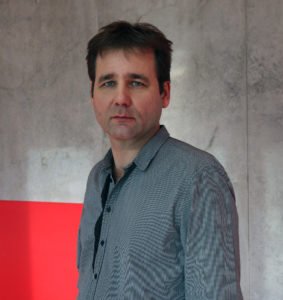 Nils Trede was born in 1966 in Heidelberg, Germany. He moved to Paris in 1996 where he did a large part of his studies and where he worked as a general practitioner in eastern Paris. For several years he has made replacements in various regions throughout France. Since 2009 he lives in Strasbourg. He is employed at the French Blood Establishment and in a preventive medicine establishment at the University of Strasbourg. Nils Trede regularly runs writing workshops for adults and in schools. He writes occasional short films for the French-German cultural program “Karambolage” on Arte.
Nils Trede was born in 1966 in Heidelberg, Germany. He moved to Paris in 1996 where he did a large part of his studies and where he worked as a general practitioner in eastern Paris. For several years he has made replacements in various regions throughout France. Since 2009 he lives in Strasbourg. He is employed at the French Blood Establishment and in a preventive medicine establishment at the University of Strasbourg. Nils Trede regularly runs writing workshops for adults and in schools. He writes occasional short films for the French-German cultural program “Karambolage” on Arte.
Considering the world and the human species as complex and mysterious entities that are not limited to a rational approach, the characters of Nils Trede advance in the darkness instead of walking straight to the goal in the light of day, however trying to take stock of the uncertainties surrounding them. The central theme of Nils Trede is undoubtedly the individual’s place in society, the question of the possibility of freedom for a person exposed to the looks, the judgments, the habits of his/her peers. In his current writing project for which he is supported by the Treilles Foundation and Villa Marguerite Yourcenar, Nils Trede is interested in our contemporary world which imposes on the individual a continual identity mutation.
To date, Nils Trede has published two novels : La Vie pétrifiée (The Petrified Life) in 2008 by “Quidam” and Le noeud coulant (The slipknot), in 2012 by “Les impressions nouvelles”.
Patrick Autréaux, Mamadou Ly et Marc Pautrel
In 2015, the Fondation des Treilles welcomed Patrick Autréaux, for 2 months, for an essay on the place of literature in turbulent times, Mamadou Ly, for 4 months, for an essay on André Malraux and poetry, and Marc Pautrel, for 2 months, for a novel named Ozu, in reference to the Japanese filmmaker.
Patrick Autréaux
 Patrick Autréaux was born in 1968. In addition to studying medicine and anthropology, he writes poetry and contemporary art critics.
Patrick Autréaux was born in 1968. In addition to studying medicine and anthropology, he writes poetry and contemporary art critics.
He decided to stop his practice of emergency psychiatry in 2006. The experience of illness as an inner experience is the theme of a writing cycle completed with Se survivre (Survive to oneself), Éditions Verdier. He published, with Gallimard, Dans la vallée des larmes (in the tears valley), Soigner (caring), Le dedans des choses (the inside of things) which are short stories. The novel Les Irréguliers (The Irregulars) was released with the same publisher in 2015. The summer of the same year, at the festival of Avignon, his play was programmed : Le grand vivant (The big living), directed by and starring Thierry Thieû Niang and Vincent Dissez. He was a laureate of the Yourcenar Villa, the Paris-Quebec Stock Exchange and the Amic Price of the French Academy.
The ambition of his project at Les Treilles was to question the possible place of literature in “times of misfortune” – what resists and stands among the ruins. His book : La voix écrite (the written voice) was published by the Verdier editions in 2017.
Mamadou Ly
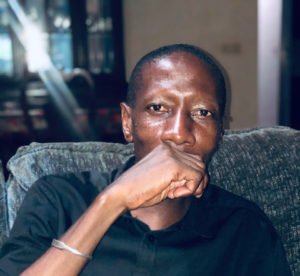 Mamadou Abdoulaye Ly was born in Senegal in 1978. After attending the Gaston Berger University of Saint-Louis and the Cheikh Anta Diop University of Dakar, he continued his studies at Lyon 2 University and Lyon 3 University. He also taught French literature at the University of Limerick in Ireland between 2010 and 2011, then at Yunnan University in China between 2011 and 2014. He is a research associate at the CNRS French speaking Manuscript Research Group.
Mamadou Abdoulaye Ly was born in Senegal in 1978. After attending the Gaston Berger University of Saint-Louis and the Cheikh Anta Diop University of Dakar, he continued his studies at Lyon 2 University and Lyon 3 University. He also taught French literature at the University of Limerick in Ireland between 2010 and 2011, then at Yunnan University in China between 2011 and 2014. He is a research associate at the CNRS French speaking Manuscript Research Group.
He is also the author of an essay on La Théâtralité dans les romans d’André Malraux (The Theatricality in André Malraux’s novels) published by L’Harmattan in 2012 and of several scientific articles on French literature of the nineteenth and twentieth centuries published in major academic journals such as the André Malraux Review, the Australian Journal of French Studies or the Journal of Literary History of France and in the blog of Pierre Assouline “La république des Livres”.
Winner of the Treilles Foundation author’s residency prize in 2015, he devoted his residency to writing an essay: Malraux et la poésie (Malraux and poetry), published in 2016 by l’Harmattan (coll. Approches Littéraires).
Marc Pautrel
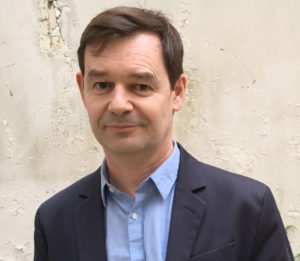
Marc Pautrel was born in 1967. After studying law, he decided to devote himself to writing. He received the Aquitaine Literary Prize in 2010 and was a laureate of the Stendhal Missions in 2012. He is the author of a collection of stories : Le Métier de dormir (the job of sleeping), Ed. “Confluences”, 2005, a fictional autobiography : Je suis une surprise (I am a surprise), Ed. “In8”, 2009, and four novels published by Gallimard in Philippe Sollers’ collection « L’Infini »: L’homme pacifique (the peaceful man) (2009), Un voyage humain (a human journey), 2011, Polaire (polar), 2013 and Orpheline (orphan), 2014.
During his two months residency in Les Treilles, he worked on a book, Ozu, in reference to the Japanese filmmaker, published by Louise Bottu in 2015. In this novel, Marc Pautrel slips into the keen eye of the director in Tokyo. He writes about his life, his passions, his dramas, his doubts, his losses, his flowers, his work. Ozu is an immersion into the filmmaker’s life and in the light of his films, which continue to flourish every spring.
Olivier Bessard-Banquy et Patrice Nganang
In 2014, the Fondation des Treilles welcomed Olivier Bessard-Banquy for 4 months for a book on publishing, and Patrice Nganang, also for 4 months, for a book on the civil war in Cameroon.
Olivier Bessard-Banquy
Doctor of Philosophy, Olivier Bessard-Banquy is a university lecturer, specialist in contemporary literature and publishing, and in charge of teaching publishing and bibliology at the Book Professions sections of the University of Bordeaux-III. A former publisher, he collaborated with various Parisian publishing houses. He co-wrote part of the volume on the centenary of the NRF (Nouvelle Revue Française) published in 2011 by Gallimard : Gallimard 1911-2011, un siècle d’édition (Gallimard 1911-2011, a century of publishing) and in 2012 he published a pocket essay, L’Industrie des lettres (the Letters industry), in the series Agora at Pocket. He worked for the same house on an essay on the book in the 20th century from the archives of publishers deposited at IMEC (Institut Mémoire de l’Edition Contemporaine) where he is an associate researcher.
In Les Treilles, he could advance in the development of this book by studying the funds of the André Gide-Jean Schlumberger centre, which has many unpublished documents from the famous co-founder of the NRF and a very rich collection of documents transmitted by the former archivist of the Gallimard house. The result of his research work: La fabrique du livre (the book factory) was published in 2016 by the Editions des Presses Universitaires de Bordeaux & Du Lérot.
Patrice Nganang
Born in Cameroon in 1970, Patrice Nganang is a writer and professor of literary theory at the State University of New York.
Author of several essays and fiction, he will work on a new novel, the third sequence of a trilogy called ‘Three Wars‘ begun with Mont plaisant (Pleasant Mount) (Philippe Rey, 2011: Special mention of the Five Continents Award of the Francophone countries, translations in German, Norwegian and Portuguese), continued with La Saison des prunes (The Season of Plums) (Philippe Rey, published in March 2013), which presents Cameroonian lives during the tumultuous periods of this country’s history, and explores the extent to which these have been defined by the Great Wars. The First World War for Mont Plaisant; World War II for The Season of Plums; for the third part, the Civil War that shook Cameroon from 1958 to 1971, and was marked by the maquis, the memory of which still painfully defines the Cameroonian present.
The challenge is to present the war less as a means of political argument, than as a moment during which Africans and Europeans found themselves embarked in a violent adventure that changed them all. War thus appears as a fabric that has linked Africans to the world, and as the moment of production of a new culture, even if happening brutally. His book Empreintes de crabe (crab footprints) was published by the JC Lattès editions.
Alvaro de la Rica et François Jullien
In 2013, the Fondation des Treilles welcomed François Jullien for 4 months for a book on the “spirit” of a landscape, and Álvaro de la Rica, for 3 months, for a work on the experience of war by a group of Franco-Spanish writers on the Basque border.
François Jullien
A graduate of the Ecole Normale Supérieure of the Ulm street, and an aggregation holder, François Jullien studied at the Universities of Beijing and Shanghai and was responsible for the French Sinology Antenna in Hong Kong between 1978-1981. Director of the Marcel Granet Center, Director of the Institute of Contemporary Thought (2002-2011), he is now a professor at the University Paris-Diderot. He is interested in General Philosophy and Chinese thought as well as cross-cultural issues.
During his residency at the Treilles, he took up the question of “the spirit of a landscape”, taking advantage of the differences between Chinese and European thought.
In thought as in Chinese painting, the landscape is conceived, not in a perceptive way, but, as traditionally in China, from the polarity of energies: shan-shui, “mountains and waters”: the High and the Down, what is immobile and what is mobile, what has a form (the mountain) and what is without form (water), etc. That is to say, the “landscape” in China, far from being conceived as a fragment of a country subject to the authority of gaze and delimited by its horizon, is understood from the functional globality of elements who oppose each other by answering each other, etc.
In his 2014 book, Vivre de Paysage ou l’impensé de la raison (Living with sceneries or the unthought of reason), Gallimard, NRF, collection Bibliothèque des idées, he recounts Chinese literature devoted to landscape, as well as that of the Arts of painting of ancient China, to try to better understand what may be called the “spirit” of a “landscape”.
Álvaro de la Rica
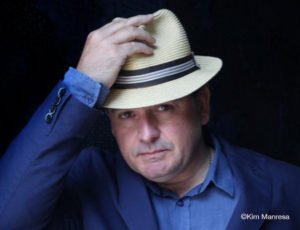 Álvaro de la Rica (born in 1965) is Professor of Theory of Literature and Comparative Literature at the University of Navarre (UN, Spain).
Álvaro de la Rica (born in 1965) is Professor of Theory of Literature and Comparative Literature at the University of Navarre (UN, Spain).
Biographer of Julien Green, he has published among others La luz y la mirada. Aproximación a la autobiografía by Julien Green, (Eunsa, Pamplona, 1993), En lo más profundo del bosque. La juventud de Julien Green, (Encuentro, Madrid, 1999), Estudios sobre Claudio Magris, (Eunsa, Pamplona, 2000), Homenaje a José Jiménez Lozano, (Eunsa, Pamplona, 2006) and his latest monograph Kafka y el Holocausto (Trotta , Madrid, junio 2009) translated and published by Gallimard (col. Arcades) in 2014. Literary critic in the newspapers “ABC”, “El Mundo” and La “Vanguardia” (Barcelona), he collaborates among others with the “Revista de Occidente” founded by Ortega y Gasset. In 2012 he published La tercera persona, his first novel.
During his stay at the Treilles Foundation, he worked on the common experience of a group of French and Spanish writers around the Basque border during the first half of the 20th century. It is a first analysis of their tribulations between the experience of war (World War I, Spanish Civil War, World War II) and exile, and the search for a literary form halfway between play and tragedy:
“I will start by studying the novel by Miguel de Unamuno: How a novel is made. This work, which the Basque philosopher wrote during his exile in Paris, is the first attempt to include an explicit metadiscursive element in the European narrative genre. Very quickly, the “unamunesque” quest was recognized in France for its literary and anthropological value, and initiated a dialogue at the same time artistic, political and existential between a significant number of intellectuals of the two countries who spent part of their life in foot of the Pyrenees. My research follows this extraordinary thread that has been woven between writers and artists like Bergamín, Malraux, Jules Supervielle, Claude Esteban, Pablo Palazuelo, Eduardo Chillida, Martin Heidegger, Valéry Larbaud, Florence Delay and Ramón Gomez de la Serna during the decades of crises and political ruptures that have made the history of the past century. “
His book, Órdago, un paseo por la frontera vasca del Pirineo, was published by Vaso Roto in 2019.
Daniel Grojnowski et Nathalie Zaccaï-Reyners
The Fondation des Treilles welcomed Daniel Grojnowski in 2012 for 2 months, for a book on the “spirit” of landscapes, and Nathalie Zaccaï-Reyners, for 3 months, for a research on the quality of relationships in the care sector.
Daniel Grojnowski
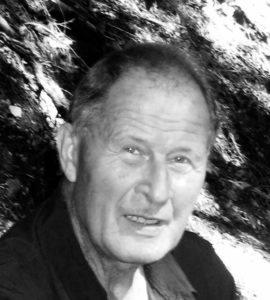 Born in 1936, Daniel Grojnowski is Professor Emeritus at Paris VII University, Denis Diderot (U.F.R. Letters, Arts, Shows). He has published a few collections of poems, and short stories and a number of editions of classical authors, notably A. Allais, J.-K. Huysmans, J. Laforgue and G. Rodenbach in Flammarion’s G-F collection, for which he prepared an edition of Bergson’s Laugh (meant to be published in 2013).
Born in 1936, Daniel Grojnowski is Professor Emeritus at Paris VII University, Denis Diderot (U.F.R. Letters, Arts, Shows). He has published a few collections of poems, and short stories and a number of editions of classical authors, notably A. Allais, J.-K. Huysmans, J. Laforgue and G. Rodenbach in Flammarion’s G-F collection, for which he prepared an edition of Bergson’s Laugh (meant to be published in 2013).
Writer essayist, he devoted himself particularly to two sectors which were the object of publications:
1. Photography : Photographie et langage (Photography and Language), José Corti, 2002 – Usages de la photographie (Uses of Photography), José Corti, 2010 – Photographie et croyance, la différence (Photography and Belief, the difference), 2012
2. The comic productions : Aux commencements du rire « moderne » (At the beginning of “modern” laughter), José Corti, 1997 – Comiques (Comedians), from Alphonse Allais to Charlot, Septentrion, “Object”, 2004 – Fumisteries (shams) (Anthology, in collaboration with B. Sarrazin), Omnibus, 2011. Other books published : Album zutique, G-F, 2016 (with Denis Saint Amand), L’imaginaire de la prostitution (the prostitution imaginary), Hermann, 2017 (with Mireille Dottin-Orsini), Huysmans, Moreau, Salomé. La fin du “moderne” (Huysmans, Moreau, Salomé. The end of “modern times”), Septentrion, 2020, Marcel Duchamp, caricaturiste de presse (Marcel Duchamp, press cartoonist), Marguerite Waknine, 2020.
During his stay at the Treilles Foundation, he worked on the consecration of laughter in modern and contemporary plastic art (Dada, New Realism, etc.). His book Les arts incohérents et le rire dans les arts plastiques (Incoherent arts and laughter in fine arts), published by Corti editions, deals with the founding manifestations of the Inconsistent Arts which took place, under the direction of Jules Lévy, at the end of the 19th century, in Paris, in the framework of annual exhibitions, from 1881 to 1892.
Nathalie Zaccaï-Reyners
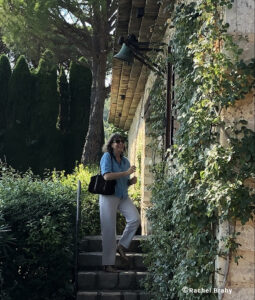 Doctor in Social Sciences, Nathalie Zaccaï-Reyners is a qualified researcher at the Fund for Belgian Scientific Research (FRS-FNRS). She continued her activities at the Institute of Sociology of the Université Libre de Bruxelles, where she was director from 2008 to 2011. Member of the Research Group on Public Action, her research falls into two fields: moral sociology and the epistemology of social sciences (access to a selective bibliography).
Doctor in Social Sciences, Nathalie Zaccaï-Reyners is a qualified researcher at the Fund for Belgian Scientific Research (FRS-FNRS). She continued her activities at the Institute of Sociology of the Université Libre de Bruxelles, where she was director from 2008 to 2011. Member of the Research Group on Public Action, her research falls into two fields: moral sociology and the epistemology of social sciences (access to a selective bibliography).
During her stay at the Fondation des Treilles, she continued her research on the mutual respect and quality of care relationships in residential institutions for vulnerable people, focusing on continuing to explore the sources of moral imagination at the heart of care.
Jacques Dewitte
In 2011, the Treilles Foundation welcomed Jacques Dewitte, the only winner for the year 2010.
Philosopher, translator and writer, Jacques Dewitte, born in Brussels in 1946, currently shares his life between Berlin and Brussels. Being philosophically in the phenomenological and hermeneutical tradition, concerned with both political and aesthetic issues, he is the author of an important work that was first developed in journals such as Le Temps de la réflexion, The European Messenger, The Modern Times, Criticism, Commentary, Spirit, The Mauss Review, with articles on topics as diverse as nihilism, the question of evil, the living, urban architecture, landscape, the language, opera, art, literature.
He has particularly translated two books by Leszek Kolakowski and several German books.
He has published four books: Le pouvoir de la langue (The power of language) and la liberté de l’esprit (The freedom of mind). Essai sur la résistance au langage totalitaire (essay on resistance to totalitarian language), Michalon, 2007; L’exception européenne. Ces mérites qui nous distinguent (The European exception. The merits that distinguish us), Michalon, 2008; La manifestation de soi. Eléments d’une critique philosophique de l’utilitarisme (The manifestation of oneself. Elements of a philosophical critique of utilitarianism), La Découverte (collection “MAUSS Library”), 2010. Kolakowski. Le clivage de l’humanité (Kolakowski. The cleavage of humanity), Michalon (collection “Le bien Commun”), 2011.
Three other books were planned to be published at the time : Le mythe chez Hans Jonas (The myth by Hans Jonas); Une discordance flagrante. Essai sur les méfaits et bienfaits de l’inconséquence (A flagrant discordance. Essay on the misdeeds and benefits of inconsistency); Plus loin que le bout de son nez (Further than the tip of one’s nose).
He finished a major book on language, languages and speech, with the temporary title: En matière de langage (In terms of language), which he worked on during his stay at the Fondation des Treilles in 2011.
Rosette et Sami Tchak
In 2011, the Fondation des Treilles welcomed Rosette for 4 months to write a novel about her sentimental journey, and Sami Tchak, for 3 months, for a book evoking his father’s wisdom.
Rosette
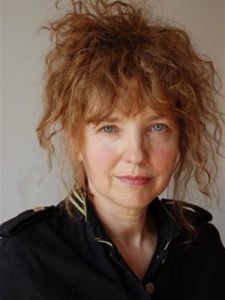 Rosette was born in Cherbourg, in the Manche, north of France. After studying in Caen, she went to Paris to start a career as an actress. Since the 1980s, she has played in three theater plays, in a dozen TV films and especially obtained various roles in thirty cinema films. With director Eric Rohmer, she has established a special relationship and is present in six of his works. He will also realize the video of her song « Bois ton café, il va être froid » (Drink your coffee, otherwise it will be cold) that she creates in 1986.
Rosette was born in Cherbourg, in the Manche, north of France. After studying in Caen, she went to Paris to start a career as an actress. Since the 1980s, she has played in three theater plays, in a dozen TV films and especially obtained various roles in thirty cinema films. With director Eric Rohmer, she has established a special relationship and is present in six of his works. He will also realize the video of her song « Bois ton café, il va être froid » (Drink your coffee, otherwise it will be cold) that she creates in 1986.
In parallel with her work of actress, Rosette realizes a series of seven short films where she stages her fantasy adventures. In 2008, her first novel Le grand méchant père (The big bad Father) is published by Grasset and describes, between fairy tale and reality, the sensitive experience of a torment and a story.
In 2010, she was a resident of the Treilles Foundation and wrote her second introspective and open novel: Pas farouche (not fierce), published by Grasset in 2015.
Sami Tchak
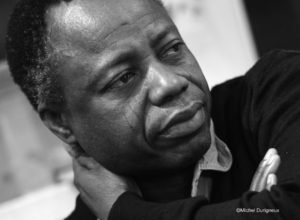 Sami Tchak, pseudonym of Sadamba TCHA-KOURA, writer, was born in Togo in 1960. After a degree in philosophy obtained at the university of Lomé, capital of his country, in 1983, he taught in a high school for three years. He arrived in France in 1986 for studies in sociology and obtained his doctorate at the Sorbonne (Paris V) in 1993.
Sami Tchak, pseudonym of Sadamba TCHA-KOURA, writer, was born in Togo in 1960. After a degree in philosophy obtained at the university of Lomé, capital of his country, in 1983, he taught in a high school for three years. He arrived in France in 1986 for studies in sociology and obtained his doctorate at the Sorbonne (Paris V) in 1993.
It was in the course of his sociological activities that chance led him to Cuba in 1996 for seven months of research on prostitution. Subsequently, he has developed a passion for Latin America and its literatures, which is reflected in some of his books. He has published to date four essays and six novels including Place des Fêtes (Parties place), Gallimard, 2001 (translated into Spanish and German) and Le paradis des chiots (puppies paradise), Mercure de France, 2006, (Kourouma award). In recent years, he has devoted himself to literature, which gives him the opportunity to travel around the world.
During his stay in les Treilles, he worked on his book, Ainsi parlait mon père (Thus spoke my father), at JC Lattès editions. It was indeed in his father’s forge that his education began. Coal, bellows, fire, anvil, reddened iron and hammer preceded the pages and the pen. And mostly his father’ stories. This dialogue lasted more than forty years and was only interrupted by the father’s death in 2003 but he continues to hear his voice, words and wisdom. These pages are a fragment of the stories of this man who used to tell his son, “Listen to me and sort out. Listen to me and diffuse my words. There will just be crumbs left in the end, but the essential will remain”.
Hélène Prigent et Marie le Drian
In 2009, the Fondation des Treilles welcomed the 2008 laureates and first winners of the author’s residency prize : Marie Le Drian and Hélène Prigent.
Marie Le Drian
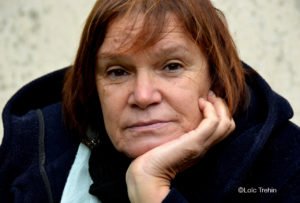 Marie Le Drian was born in Lanester (Morbihan, Brittany). She studied in Rennes, then worked in Paris for several years. She published her first story Keraliguen in 1983. Short stories and novels followed including Le Petit bout du L (the little end of the L), at Laffont editions, and Hôtel maternel (maternal hotel), at Julliard. In 1999, she obtained a scholarship from the Canton of Berne (Switzerland) and spent a year in the bilingual city of Bienne, during which she wrote La Cabane d’Hippolyte (Hippolyte’s hut), which obtained the Brittany Prize 2001 and the Novel Breizh prize in 2001.
Marie Le Drian was born in Lanester (Morbihan, Brittany). She studied in Rennes, then worked in Paris for several years. She published her first story Keraliguen in 1983. Short stories and novels followed including Le Petit bout du L (the little end of the L), at Laffont editions, and Hôtel maternel (maternal hotel), at Julliard. In 1999, she obtained a scholarship from the Canton of Berne (Switzerland) and spent a year in the bilingual city of Bienne, during which she wrote La Cabane d’Hippolyte (Hippolyte’s hut), which obtained the Brittany Prize 2001 and the Novel Breizh prize in 2001.
On her return to France, she left Paris and moved permanently to Brittany, Clohars-Carnoët (Finistère) where she devoted herself to writing. Her next novel Attention éclaircie (lightened attention) was published in 2007 at the Éditions de la Table Ronde. Marie Le Drian benefited from a writing residency at the Fondation des Treilles where she stayed for four months.
Her book Le corps perdu de Suzanne Thovers (the lost body of Suzanne Thovers), at Apogee editions, “Star Pique” collection, won the Jean Bernard Prize of the 2014 Academy of Medicine. In fragile little steps, with hints of tongue-in-cheek humor, she lingers on the simple things of a daily life devastated by depression.
Hélène Prigent
Hélène Prigent worked at the Réunion des Musées Nationaux (Meetings of national museums) for twelve years. Assistant to Jean Clair for the preparation of the exhibition Mélancolie. Génie et folie en Occident (Melancholy. Genius and madness in the West), presented in Paris in 2005 at the Grand Palais National Galleries, she is the author of Mélancolie. Métamorphoses de la dépression (Melancholy. Metamorphoses of depression), published by Gallimard (collection “Découvertes”) the same year. She has participated to several conferences on this subject and prepared a book on melancholy in Greek antiquity.
She stayed at the Foundation of Treilles in spring 2009. She also published a small book, Paul Gauguin: 1848-1903 (Another title: « J’ai voulu vouloir » (I wanted to want) – Paul Gauguin), published by La Martinière – Xavier Barral, collection “Voix” , 2003, and collaborated on several collective works including the Journal de la France et des français. Chronologie politique, culturelle et religieuse, de Clovis à 2000 (Journal of France and the French: Political, cultural and religious chronology, from Clovis to 2000), Gallimard editions, “Quarto” collection, 2001 and, with Pierre Rosenberg, Chardin. La nature silencieuse (Chardin. The silent nature), Gallimard editions, collection “Découvertes”, 1999.
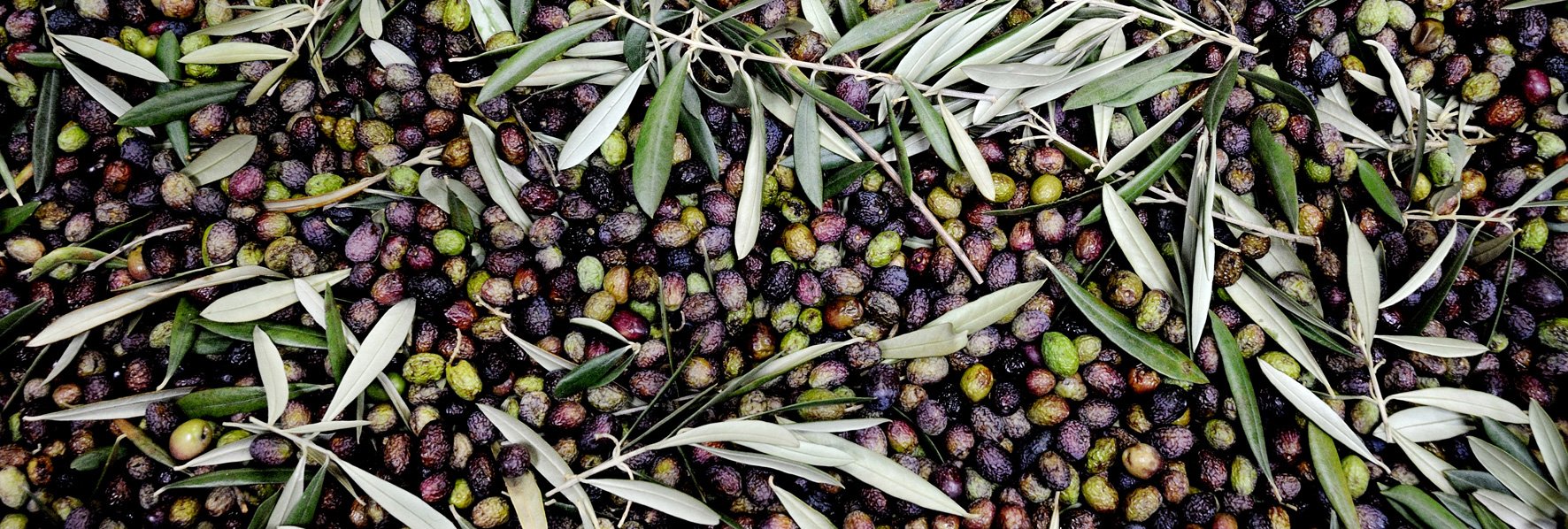
Olives © Dominique Laugé
Publications issued from the “Author’s Residency prize”
Works published by the winners of the Author’s Residency Prize since its creation in 2008 :
2023
Garance Meillon, La langue de l’ennemi, Gallimard
Clément Bénech, Un vrai dépaysement, Flammarion
2021
Sophie Divry, Curiosity, Editions Notablia
Violaine Bérot, Comme des bêtes, Editions Buchet-Chastel
2020
Olivier Dhénin, L’Atelier d’Olivier Dhénin, virtual exhibition [link to the exhibition]
Pascale Roze, La Belle Hélène, Editions Stock
2019
Louis-Philippe Dalembert, Mur Méditerranée, éditions Sabine Wespieser, Lauréate of the Prix de la Langue Française (French Language Prize) 2019″
Michaël Ferrier, Scrabble, Mercure de France, nominee at the Médicis Prize (Essay) 2019, Femina Prize 2019 and “Ecrivains du Sud” Prize 2020
Emmanuel Ruben, Sur la route du Danube, éditions Rivages, Laureate of the Nicolas Bouvier Prize 2019
Álvaro de la Rica, Órdago, un paseo por la frontera vasca del Pirineo, Vaso Roto Ediciones, 2019
2018
Olivier Dhénin, Aquis Submersus, éditions Les petites Allées
Patrice Nganang, Empreintes de crabe, éditions JC Lattès
Benjamin Pelletier, Les Années discrètes, éditions Arlea
Sami Tchak, Ainsi parlait mon père, éditions JC Lattès
Kettly Mars, L’Ange du patriarche, éditions Mercure de France
2017
Patrick Autréaux, La voix écrite, éditions Verdier
2016
Mamadou Abdoulaye Ly, Malraux et la poésie, éditions l’Harmattan (coll. Approches Littéraires)
Olivier Bessard-Banquy, La fabrique du livre, éditions des Presses universitaires de Bordeaux & Du Lérot
2015
Rosette, Pas farouche, éditions Grasset
Daniel Grojnowski, Les arts incohérents et le rire dans les arts plastiques, éditions Corti
Marc Pautrel, Ozu, éditions Louise Bottu
2014
François Jullien, Vivre de paysage ou L’impensé de la Raison, éditions Gallimard
2013
Marie Le Drian, Le corps perdu de Suzanne Thovers, éditions Apogée, collection « Piqué d’étoiles », prix Jean Bernard de l’Académie de Médecine 2014.

